
AUGUST 2023 Natalie Barranco, co-founder of Prime Business Advisory Solutions, offers her top tips for finding success in today’s changing marketplace. FINANCE THE ISSUE LOOKING TO BECOME MORE EFFICIENT AND PROFITABLE? TO RAISE OR NOT TO RAISE Clean Energy and Higher Pay: GNO, Inc.’s Michael Hecht shares plans P. 32 Not Another Coffee Shop: New addition to Magazine Street offers bean lovers something new P. 54 Cancer Care Gamechanger: Ochsner’s partnership with MD Anderson comes at a critical time P. 24 Is it time for Louisiana to raise the minimum wage?
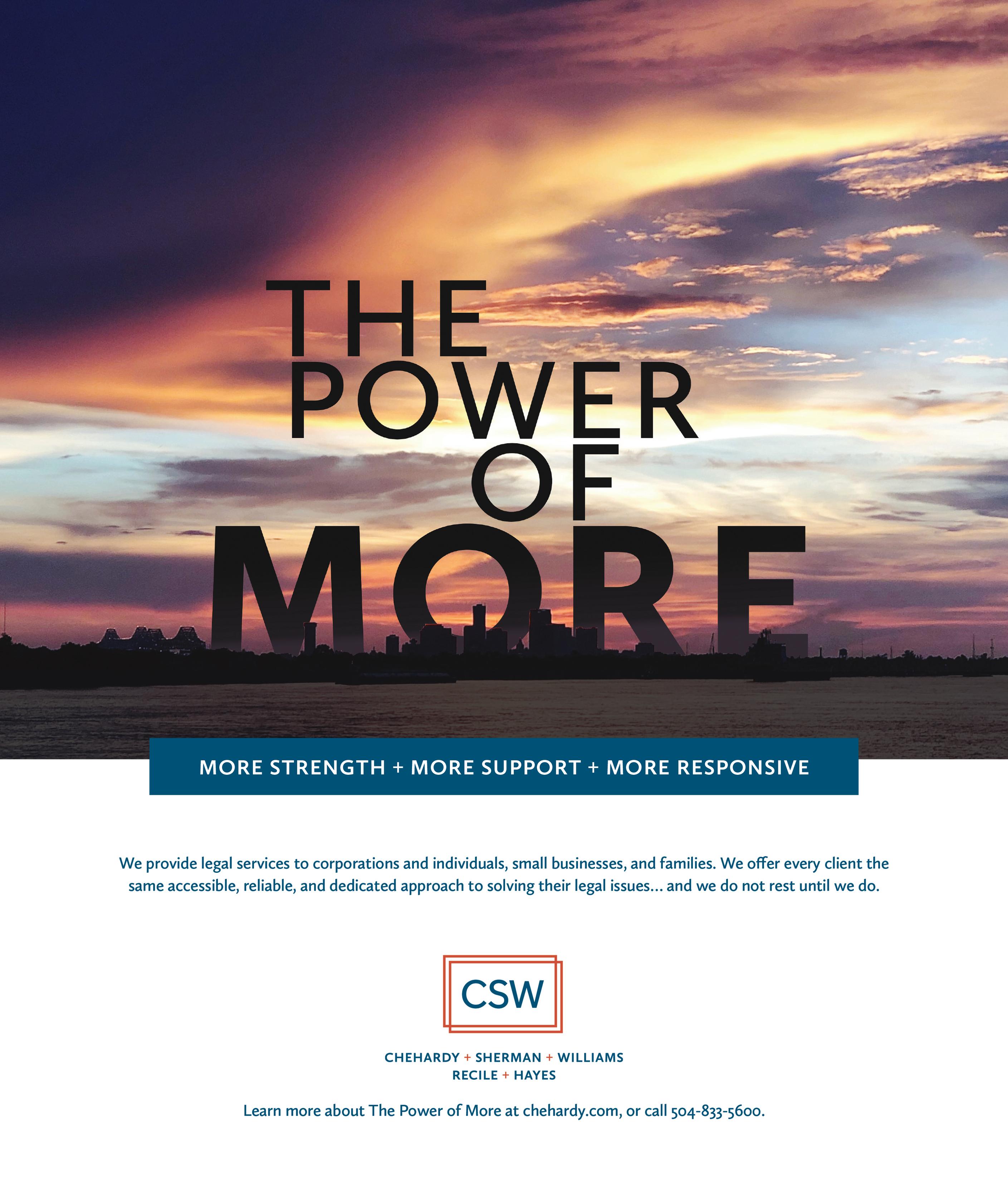


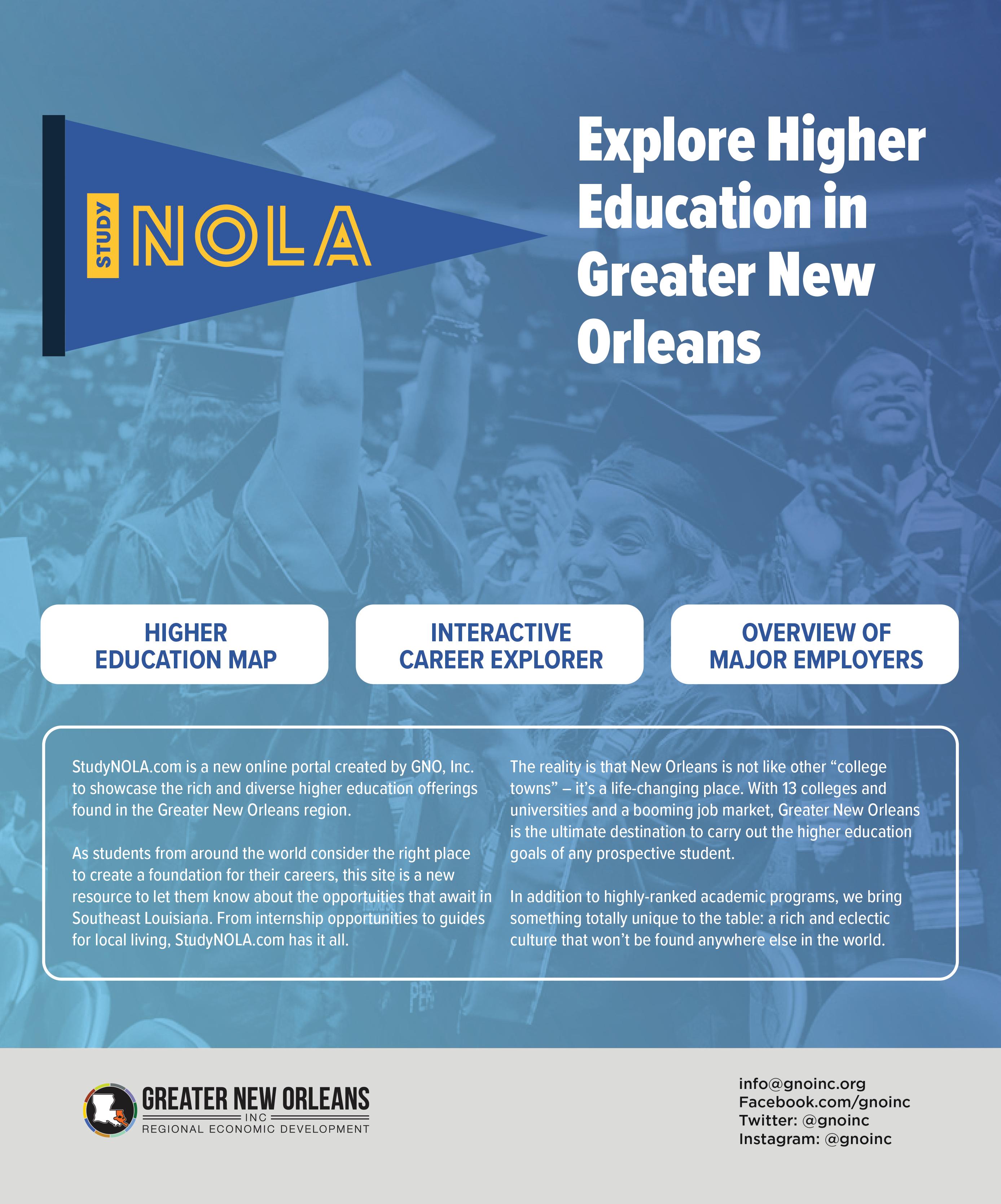
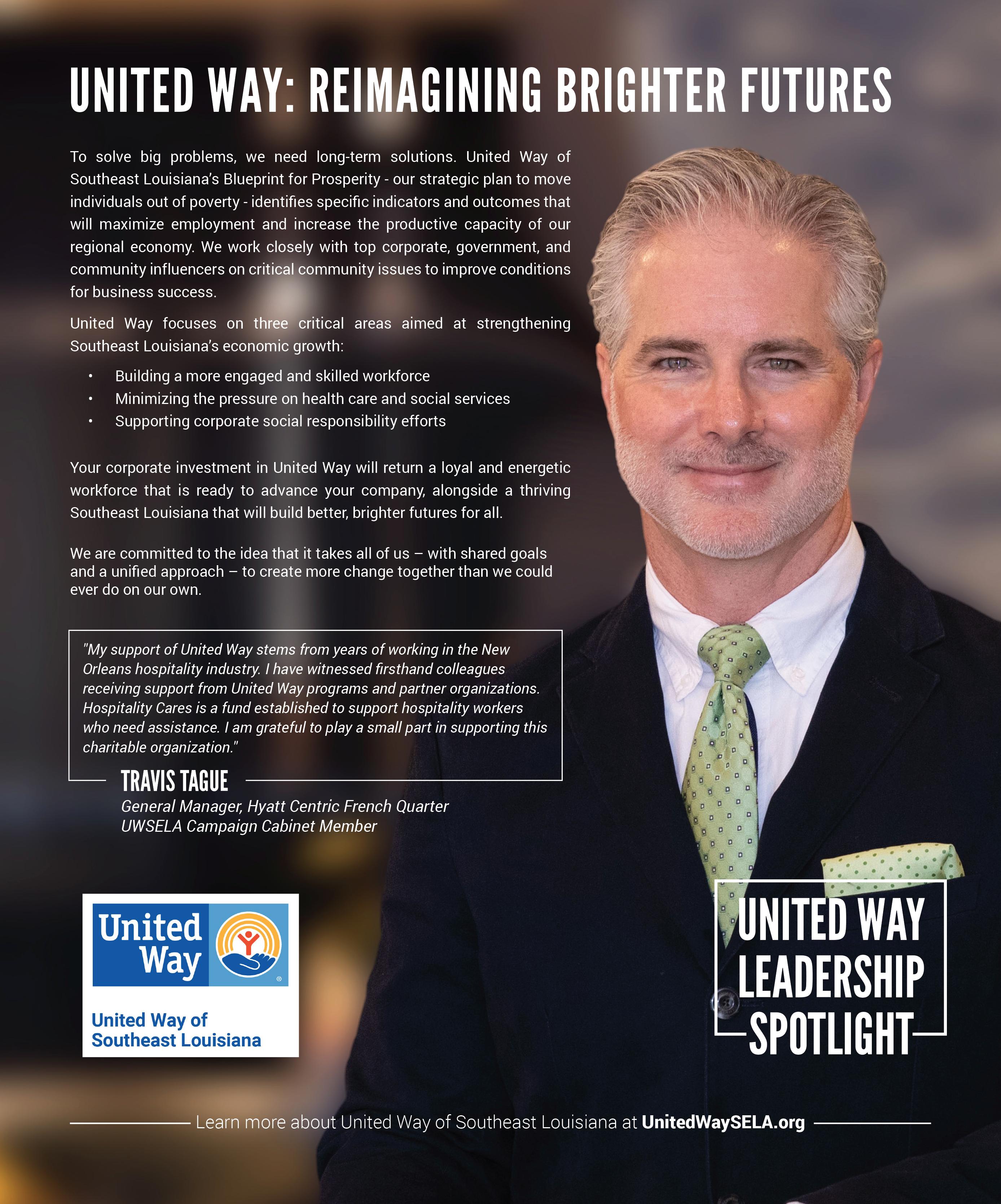


New
tech
54
GREAT WORKSPACES
Current Crop Roasting Shop on Magazine Street provides a fun and interactive setting for coffee lovers to learn more about the bean, including how to roast their own.
62 NEIGHBORHOOD GEM
A fixture on Metairie Road since 1960, this family run institution continues to serve as a neighborhood summer hangout.
64 NEW ORLEANS 500 John LeBlanc, CEO of Metairie Bank
WHY DIDN’T I THINK OF THAT? Just three years in business, Bea’s Bayou Skincare products — homemade creations of New Orleanian Arielle Brown — are selling quickly on Amazon and Macy’s Marketplace online.


co-founder
Is

24 HEALTHCARE MD Anderson President: “There’s never been a moment like this in oncology. 26 REAL ESTATE + CONSTRUCTION New Orleans has the opportunity to be a leader in fighting the effects of climate change. 32 ECONOMIC DEVELOPMENT As Louisiana embraces a move toward clean energy and higher paying industries GNO, Inc., is paving the way to success. 34 GUEST It’s vital for our technology industry that we recruit Louisiana’s underprivileged youth. EVERY ISSUE FROM
LENS PERSPECTIVES 08 EDITOR’S NOTE 10 PUBLISHER’S NOTE 12 ON THE WEB IN THE BIZ 16 DINING Dorignac’s has been producing many local favorite delicacies for decades. 18 SPORTS With a wide-open NFC South, can the Saints return to the top of the division and the playoffs? 20 ENTREPRENEUR French President Emmanuel Macron is making big efforts to increase startups.
THE
VOLUME 09 ISSUE 11 AUGUST
58
28
Diversity is a must
TECH
in
Orleans’
industry. 42 To Raise or Not to Raise
it
to
the minimum wage?
time for Louisiana
raise
36 Looking to Become More Efficient and Profitable?
in
Natalie Barranco,
of Prime Business Advisory Solutions, offers her top tips for finding success
today’s changing marketplace.



7 BIZNEWORLEANS.COM Bringing home the dream. You’ve waited. You’ve searched. Now it’s time. Whether you apply online or in-branch, our mortgage team has the experience to bring your vision into reality. From streamlined service to expedited closings, we know how to bring it home. We’re your people. All loans subject to credit approval. redriverbank.net 504-354-5500 Alexandria Baton Rouge Lafayette Lake Charles New Orleans Northshore Shreveport
Money On My Mind
I’ve found that August is a good time to get things in order. The weather is so incredibly hot that life seems to slow down a bit and personally, I tend to hunker down at home in what is the South’s winter.

Maybe it’s the anxiety of being in prime hurricane season, maybe it’s the new schedule brought on by the return of school for my daughter, but I am drawn toward organizing in August. There’s still plenty to be done in our relatively new home — too many cabinets still chaotic — but this year I’m focusing on getting our finances in order, inspired by this, our first-ever financial issue. With the global pandemic, followed by supply chain price increases and inflation, I don’t know anyone who’s not feeling the pinch these days. This — combined with the fact another bill to raise the minimum wage just failed again at the Louisiana Legislature — made it feel like the perfect time to address this hot button issue. Writer Carrie Crockett spoke to numerous state representatives, business people and scholars about the issue in one of this month’s two big features.
For our cover feature, we’re excited to pick the brain of a local professional whose job is to help businesses prosper. I invite you to check out Natalie Barranco’s top tips for success — including her single most important advice
for businesses in this constantly changing marketplace.
Hurricane season has also inspired a few other pieces you’ll find in this issue dealing with climate change — including a perspective piece on the opportunities for New Orleans in green infrastructure and a contributed piece by GNO, Inc., President and CEO Michael Hecht that shares the organization’s focus on making the region a leader in clean energy.
Of course, you know what they say about all work and no play, so we’ve also included some fun businesses to check out, including a booming new cosmetics company, a unique concept for coffee lovers, and an homage to the rich legacy of a local snoball stand.
Stay cool out there however you can, and thanks for reading.
KIMBERLEY SINGLETARY
Editor Kimberley@BizNewOrleans.com
Publisher Todd Matherne
EDITORIAL
Editor Kimberley Singletary
Art Director Sarah George
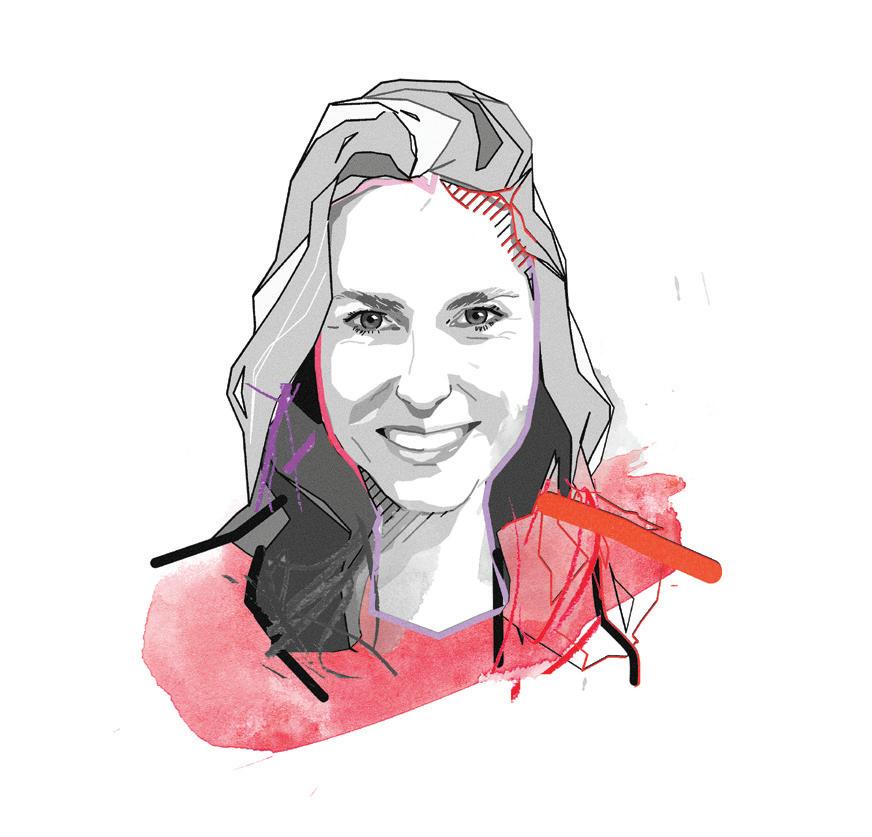
Digital Media Editor Kelly Massicot
Associate News Editor Rich Collins
Perspective Writer Drew Hawkins
Contributors Carrie Crockett, Becky Gustafson, Michael Hecht, Ashley McLellan, Chris Price, David Shapiro, Melanie Warner Spencer, Poppy Tooker, Keith Twitchell
ADVERTISING
Senior Account Executive Jessica Jaycox Mahl (504) 830-7255 JessicaJ@BizNewOrleans.com

Senior Account Executive Meghan Schmitt (504) 830-7246 Meghan@BizNewOrleans.com
RENAISSANCE PUBLISHING
PRODUCTION
Digital Director Rosa Balaguer Arostegui
Senior Designer Meghan Rooney
Production Designer Ashley Pemberton
MARKETING
Marketing Manager Greer Stewart
CIRCULATION
Subscriptions Jessica Armand
Distribution John Holzer
ADMINISTRATION
Office Manager Mallary Wolfe
VP of Sales and Marketing Kate Henry
Chief
Executive
subscriptions,
(504) 830-7231 110 VETERANS BLVD., SUITE 123 • METAIRIE, LA 70005 • (504) 828-1380 2023 Gold Best Feature Layout Gold Best Beat Reporting, Real Estate Silver Best Feature Series Silver Best Personality Profile Silver Best Cover Silver Best use of Photography/Illustrations Bronze Best Overall Design 2022 Gold Best Feature Gold Best Recurring Feature Silver Best Feature Layout 2021 Gold Magazine Design Gold Best Explanatory Journalism Gold Feature Design Silver Best Feature Bronze Best Use of Multimedia 2020 Silver Best Recurring Feature 2019 Gold Best Recurring Feature Gold Best Explanatory Journalism 2018 Gold Most Improved Publication Silver Best Recurring Feature 2017 Silver Best Recurring Feature Bronze Best Daily Email 2016 Bronze Best Feature Layout
Officer Todd Matherne For
call
EDITOR’S NOTE
Biz New Orleans is published monthly by Renaissance Publishing, LLC, 110 Veterans Memorial Blvd., Suite 123, Metairie, LA 70005; (504) 828-1380. Subscription rate: one year $48, no foreign subscriptions. Postage paid at Metairie, LA, and additional mailing entry offices. POSTMASTER: Send address changes to Biz New Orleans, 110 Veterans Memorial Blvd., Suite 123, Metairie, LA 70005. Copyright 2023 Biz New Orleans. No part of this publication may be reproduced without the consent of the publisher. The trademark Biz New Orleans is registered. Biz New Orleans is not responsible for unsolicited manuscripts, photos and artwork, even if accompanied by a self-addressed stamped envelope. The opinions expressed in Biz New Orleans are those of the authors and do not necessarily reflect the views of the magazine or owner. NEVER MISS
ISSUE, SCAN
TODAY
AN
AND SUBSCRIBE


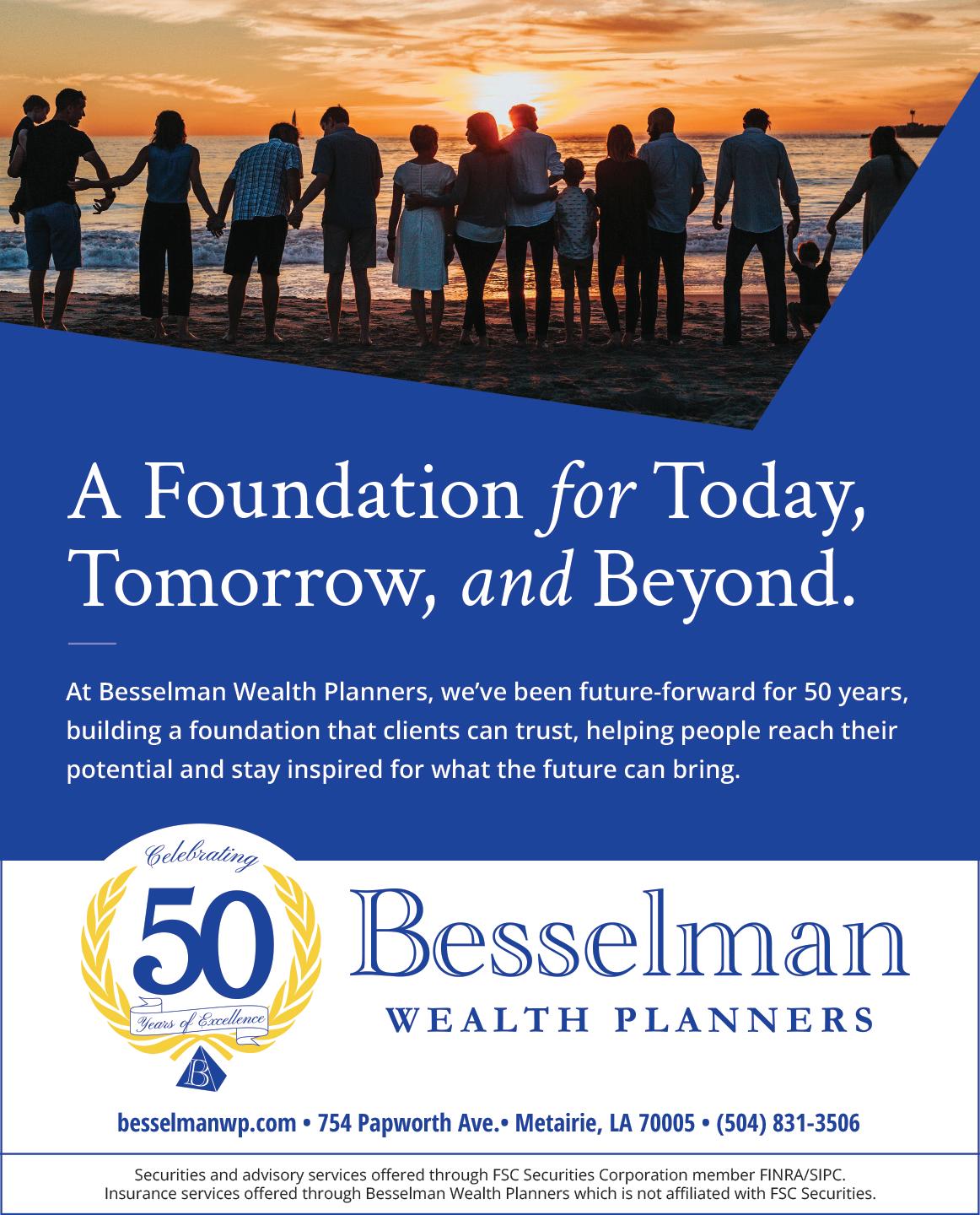
9 BIZNEWORLEANS.COM
As we approach the end of summer and begin to shift toward back-toschool preparations and Labor Day in New Orleans, I am reminded of my conversations with friends starting a family. I also share this advice with my daughters and sons-in-law, as they start their own families.
The school education calendar is now padded with extra days in preparation of severe weather and unexpected closings, which means schools are now returning in early or mid-August, much earlier than when I was in school. (Boy that makes me sound old). As such, New Orleans’ families are getting in that one last vacation the first week of the month.
What I tell new parents — like Mike and Jenn, who recently added Charlotte to their growing family — is you only have 18 summers where you control the summer break. This means you get 18 opportunities to plan an experience with your family that is memorable — on your terms.
Once your kids graduate high school and are off to college or start their careers, things change. Now grown, your kids will need to fit in summer internships, or they have new positions with no days off. Your ability to control the summer break ends.



This summer, my family was able to bring some extended family together for a long weekend to see my grandson, James. Yes, he was only six months old at the time of his first summer, but that first summer will be marked with family spending time with him from across the country, and you cannot get that back.
My granddaughter, Penelope, turned two this summer and she is living it up — experiencing an extended trip to Italy, multiple trips to Pensacola and Bay St. Louis, and of course, that trip to California to see James.
More than 20 years ago, my mom and dad established their family vacation plan. The last week of June is their week. Each year, they plan a trip and cover the cost for the whole family — all we have to do is take the time off. Their goal was to get the family together outside of the holidays for a life experience, and it has worked. Our family now numbers more than 25 and this June’s trip included 16.
So, as you get back to school and in the throes of fall, I encourage you to think about how your summer was spent. Was it something memorable?
I challenge you to bring your family together and create your vacation plan before your 18 summers are behind you.
and Publisher
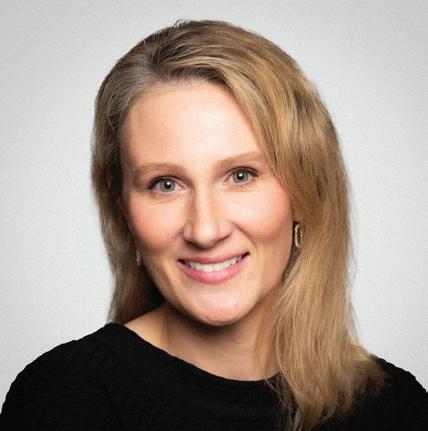
 Publishing
Publishing
10 BIZ NEW ORLEANS AUG 23
Account Executive (504) 830-7255 JessicaJ@BizNewOrleans.com KATE HENRY VP of Sales and Marketing (504) 830-7216 Kate@BizNewOrleans.com MEGHAN SCHMITT
Account Executive (504) 830-7246
PUBLISHER’S NOTE SALES TEAM
TODD
MATHERNE CEO
Renaissance
JESSICA JAYCOX MAHL Senior
Senior
Meghan@BizNewOrleans.com
18 Summers



11 BIZNEWORLEANS.COM
THE BUSINESS COMMUNITY IS TALKING ON BIZNEWORLEANS.COM
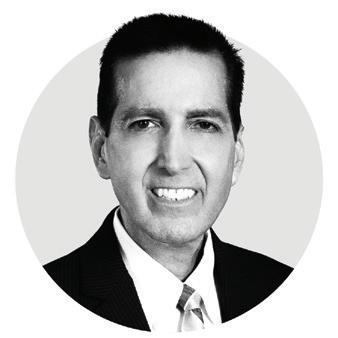

Catch all the latest news, plus original reporting, people on the move, videos, weekly podcast and blogs, digital editions of the magazines and daily Morning Biz and afternoon newsletters. If it’s important to business in southeast Louisiana, it’s at BizNewOrleans.com.
BIZ TALKS
PODCAST
Kelly Schulz, senior vice president of communications and public relations at New Orleans & Company, which hosted the 29th annual festival June 29 – July 3. The nation’s largest annual gathering of African-American musical talent, Essence Fest draws hundreds of thousands of visitors to New Orleans every year.
“I invested in Smalls Sliders because I love not only the food, but the overall experience the brand brings to its guests. A contagious, communitydriven culture drives its strong unit economics, and my partners and I are thrilled to take part in that at the franchisee level, too.”
EPISODE 157
How’s the Quality of Life in Jefferson Parish?
Jefferson Business Council Chairman Philip Rebowe share the results of the parish’s first-ever quality of life survey.
NFL legend Drew Brees, speaking about Smalls Sliders, which announced plans for a location at Clearview City Center on June 12. Nation’s Restaurant News recently named the restaurant one of its “Breakout Brands of 2023.”
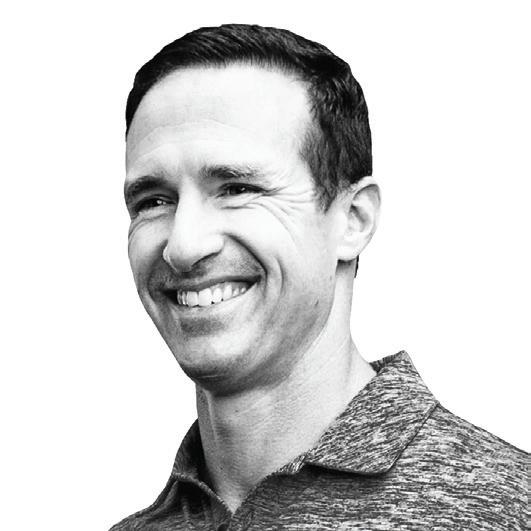
EPISODE 156

Financial Freedom for All
Becky Gustafson, financial advisor with Gustafson Wealth Management in Metairie, discusses the actions individuals in the LGBTQ+ community can take to build a strong retirement plan and feel confident in their financial future.
12 BIZ NEW ORLEANS AUG 23
ON THE WEB BIZNEWORLEANS.COM
Essence Festival of Culture is important to New Orleans not only economically, but culturally, and it sends a powerful message to the world that New Orleans is built to host events of this caliber.
AMY HARRIS/INVISION/AP



13 BIZNEWORLEANS.COM

IN THE BIZ
DINING
Dorignac’s has been producing many local favorite delicacies for decades.
18 SPORTS
With a wide-open NFC South, can the Saints return to the top of the division and the playoffs?
20
ENTREPRENEUR
French President Emmanuel Macron is making big efforts to increase startups.

16
POPPY TOOKER has spent her life devoted to the cultural essence that food brings to Louisiana, a topic she explores weekly on her NPR-affiliated radio show, Louisiana Eats! From farmers markets to the homes and restaurants where our culinary traditions are revered and renewed, Poppy lends the voice of an insider to interested readers everywhere.
Making Groceries Dorignac’s Style
BY POPPY TOOKER
The Jackson Avenue store included a dozen parking places for drive-up convenience. In New Orleans’ Lower Garden District, the modern grocery concept flourished.
When much of their clientele moved to Metairie in the early 1960s, Joe Jr. and Margaret invested in a second location just across the Orleans Parish line on Veteran’s Memorial Highway. The much larger Dorignac’s stretched over 37,000 square feet and included more than 200 parking spots. Eventually, the Jackson Avenue store closed as Joe Jr. concentrated on his burgeoning business in the suburbs. The new store included a deli and café, which served as Joe Jr.’s de facto office and living room. From his table, he conducted business while greeting friends and customers for more than 30 years.
Today, Joseph P. “Jody” Dorignac IV and his wife, Nicole, maintain the family store’s traditions while overseeing Dorignac’s business. Key to Dorignac’s customer experience are friendly baggers stationed at every checkout. It has always been a company policy to employ special needs adults whenever possible.
“Our baggers are everything you’d want in an employee,” Nicole beamed. “They’re such sweet, genuine people. It helps our cashiers, and our customers love it.”
When Jody and Nicole were dating, she began working there herself.
Since 1947, the Dorignac family has supplied New Orleans and the surrounding area with specialty groceries, wine and liquor with an especially stellar reputation for superior quality meats. The family food story began in an Irish Channel butcher shop. Lifelong butcher, Joseph P. Dorignac Sr. and his wife, Margaret Dedebant Dorignac, worked together in the meat market. When their only son, Joe Jr., joined them there, he learned the art of butchering from his father. After Joe Sr. passed away, his son began to dream of a life bigger than the butcher shop. Together with his mother, in 1947 he turned Dorignac’s One Stop Supermarket into a reality.
Originally local chain McKenzie’s operated as the in-house bakery, situated at the store’s entrance. By the 1980s, Joe Jr. realized the bakery business was a way to grow Dorignac’s margins, so he ordered special ovens from France and hired top-notch bakers to produce New Orleans’ favorite pastries and specialty cakes like Doberge. Dorignac’s became renowned for their house-made breads, especially the seeded Italian loaf known as St. Joseph’s bread, which is available year-round. When orders for mini muffulettas pour in through catering, the bakery produces the bread, often in astounding quantity.
Creole cream cheese is another unusual product produced in-house. Dorignac’s is one of the few places the New Orleans favorite can be found. Eaten mostly for breakfast, generations have started their day with this local delicacy. The store sells over 20,000 units of Creole cream cheese annually. Willie Matamoros has been dairy manager for 59 years, while employee Kim Charlot has produced all of Dorignac’s Creole cream cheese for nearly two decades, ensuring its meticulous consistency.
“I started in the courtesy booth, where people would pay their utility bills and cashiers checked in and out,” she said. “It was a wonderful way to get to know the shoppers and all the employees.”
Fittingly, Nicole’s earliest grocery shopping memories are of Dorignac’s. Her grandmother, Esther Newhouse Gallagher, took her along on frequent shopping trips.

“It was the only place she ever bought her meat,” said Nicole, who learned to love cooking from her grandmother. When she passed away, Nicole’s mother, also named Esther, continued to foster that love. Together they would prepare many beloved meals that have inspired some of Dorignac’s most popular deli dishes. From stuffed mirlitons to artichoke casserole, mac and cheese, and her classic chicken salad, Nicole’s culinary heritage shines in Dorignac’s prepared foods today.
Catch Poppy
Tooker on her radio show, “Louisiana Eats!” Saturdays at 3 p.m. and Mondays at 8 p.m. on WWNO 89.9 FM.
Jody and Nicole have one child, Margaret Nicole Dorignac, namesake of the store’s matriarch. Jody is usually in the store seven days a week, displaying the intense work ethic learned from his grandfather. For over 75 years, Dorignac’s has represented fine quality products delivered with friendly, family service. From Joe Jr.’s favorite table in the café, the tradition continues.T
16 BIZ NEW ORLEANS AUG 23
The family grocer has been producing many local favorite delicacies for decades.
IN THE BIZ DINING
ILLUSTRATION BY PADDY MILLS


17 BIZNEWORLEANS.COM
CHRIS PRICE is an award-winning journalist and public relations principal. When he’s not writing, he’s avid about music, the outdoors, and Saints, Ole Miss and Chelsea football.
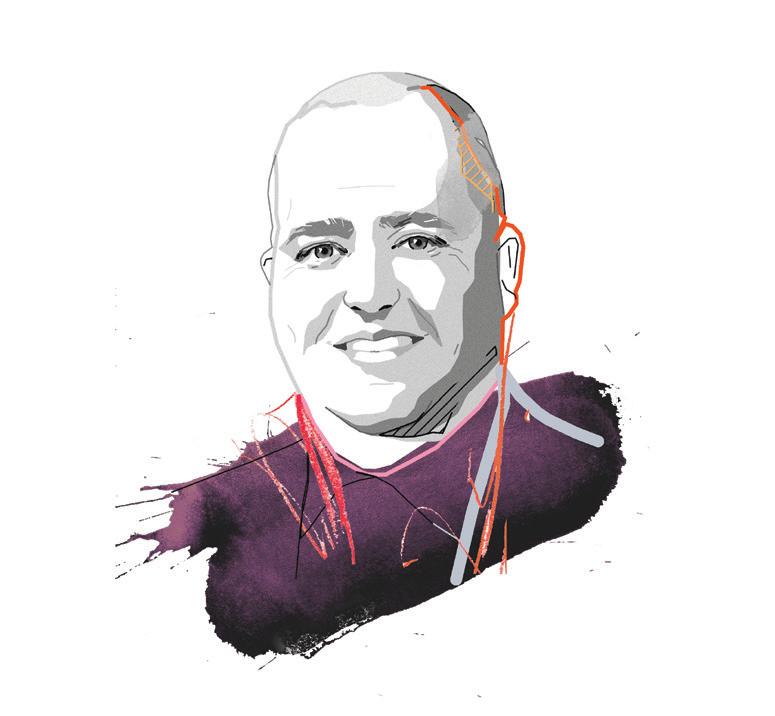
Marching In
With a wide-open NFC South, can the Saints return to the top of the division and the playoffs?
BY CHRIS PRICE
position. The Carr deal instantly gave the Saints more credibility and inserted them into the conversation of potential playoff teams.
After Carr’s addition, the next biggest stories involve five-time Pro Bowl running back Alvin Kamara and three-time Pro Bowl wide receiver Michael Thomas.
In July, Kamara agreed to plead no contest to a misdemeanor charge of breach of peace after an altercation in Las Vegas during the 2022 Pro Bowl weekend. If found guilty, he could face a significant suspension for violating the NFL’s personal-conduct policy if found guilty. If that happens, look for the Saints to feature Jamaal Williams, who led the NFL with 17 rushing touchdowns last year, and rookie Kendre Miller, a third-round draft pick out of TCU who rushed for 1,399 yards and 17 touchdowns in 2022.
to bolster the corps. It’s probably as odd to read this as it was to write it, but the secondary, led by safety Tyrann Mathieu and corner Marshon Lattimore, might be the best unit on this defense.
Last year, the Saints D kept teams from putting up big points, but the offense couldn’t manufacture enough points to win games. That shouldn’t be an issue this season.
NFC SOUTH
Finally, we are on the doorstep of the 2023 football season, and after two frustratingly disappointing seasons, the New Orleans Saints and the Who Dat? Nation are looking forward to returning to elite status.
The Saints missed the postseason the past two years, after posting a 9-8 record in 2021 and sliding to 7-10 last year under first-year head coach Dennis Allen. In that time, the team has used five different starting quarterbacks — Andy Dalton, Jameis Winston, Taysom Hill, Trevor Siemian, and Ian Book — tied for the most in the NFL with the Chicago Bears, Cleveland Browns, and Washington Commanders. In March, New Orleans signed veteran signal caller Derek Carr, this off season’s top free-agent passer, to a fouryear, $150 million deal, to bring some stability under center.
SAINTS OFFENSE
With Drew Brees at quarterback, Saints fans grew accustomed to lighting up the scoreboard. In his 15 years leading the team, the Saints averaged 28.1 points per game. Last year, New Orleans averaged 19.4. Much of that can be attributed to the revolving door at the QB
Thomas set the NFL world abuzz in 2019 when he set the NFL single-season catches record (149) and led the league with 1,725 receiving yards. Since then, injuries have limited him to just 10 games over the last three seasons, but Thomas said he’s “ready to go full speed, just like the old days and what everyone’s used to.” Paired with receivers Chris Olave and Rashid Shaheed, who averaged 17.4 yards per catch last year, this trio could be regulars on highlight reels considering Carr’s ability to throw the deep ball.
SAINTS DEFENSE
The Saints defense only gave up 20.3 points per game (ninth in the NFL) and could be poised to be a top 10 unit again. The team lost three-quarters of its defensive line when end Marcus Davenport signed with the Vikings, tackle David Onyemata moved to the Atlanta Falcons, and Shy Tuttle joined the Carolina Panthers. End Cameron Jordan will look to tackles Nathan Shepherd and Khalen Saunders and end Carl Granderson to form a solid front line. Look for 2023 first-round pick DT Bryan Bresee to rotate into the line regularly. Linebacker Demario Davis will start in the middle, flanked by Zack Baun and Pete Werner. Don’t be surprised if the Saints re-sign Kwon Alexander
The Buccaneers won their second straight NFC South crown last year with an 8-9 record. The Saints, Panthers and Falcons finished 7-10, in a three-way tie for the worst record in the NFC South. With quarterback Tom Brady retiring, it’s doubtful Tampa will three-peat. The Bucs defense and wide receivers will be testy, but they will have either journeyman Baker Mayfield or second-year pro Kyle Trask under center. The Bucs had the worst rushing offense (76.9 rushing yards per game) in 2022 and didn’t do much to improve in the offseason.
Carolina made a splash by drafting quarterback Bryce Young with the top overall pick in this year’s draft and have already named him as the starter. He should face a steep learning curve. New head coach Frank Reich will lean on the Panthers’ defense to keep the team in games this year.
The Falcons seem to be taking a different approach with their offense by featuring the ground game (55.3% of their offense in 2022). Atlanta will feature running back Bijan Robinson, the eighth overall pick in the 2023 NFL Draft. QB Desmond Ridder started the last four games of last season and will look to tight end Kyle Pitts and receiver Drake London to balance the pass attack. The Falcons D finished 23rd in scoring defense in 2022, and overhauled the unit with a new coordinator and six new starters.
There’s been a lot of movement in the NFC South, and it will take time to see how each team settles. But this could be the Saints’ year to reclaim the division. It will be an interesting to see how it all shakes out. T
18 BIZ NEW ORLEANS AUG 23
IN THE BIZ SPORTS
ILLUSTRATION BY PADDY MILLS

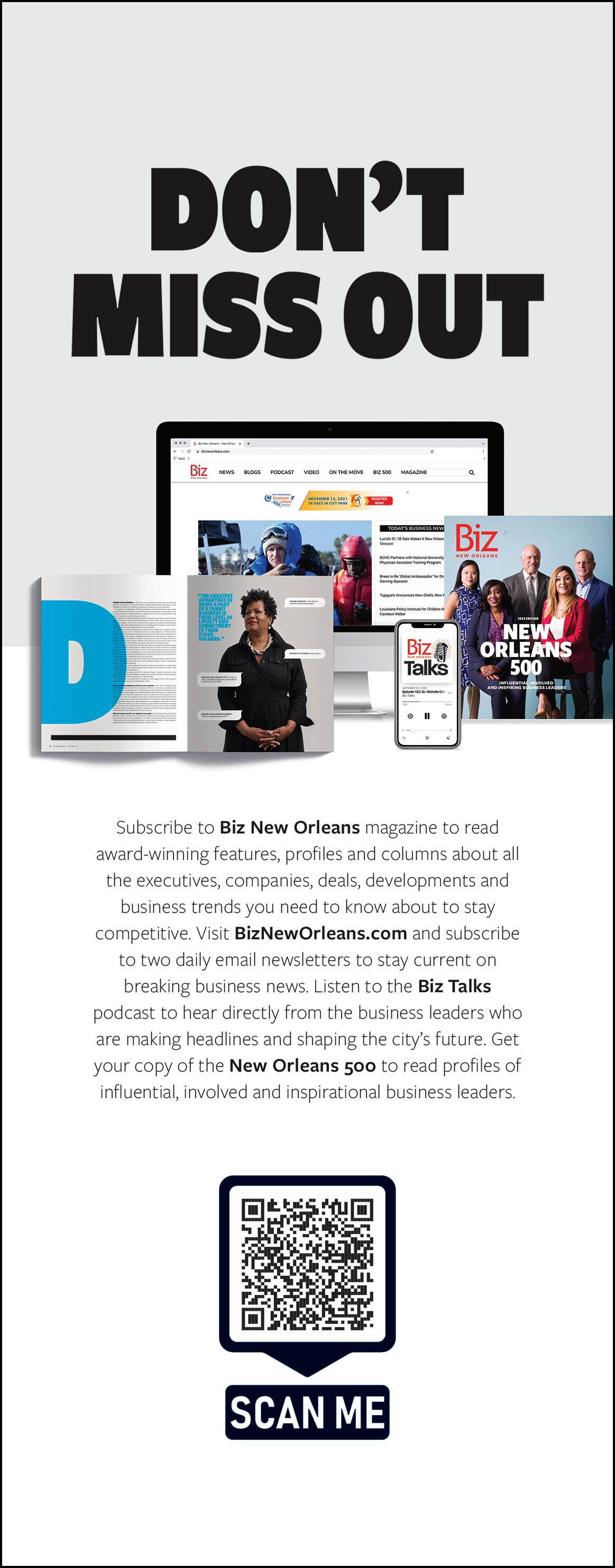
19 BIZNEWORLEANS.COM
KEITH TWITCHELL spent 16 years running his own business before becoming president of the Committee for a Better New Orleans. He has observed, supported and participated in entrepreneurial ventures at the street, neighborhood, nonprofit, micro- and macro-business levels.
French Entrepreneurism is On the Rise
President Emmanuel Macron is making big efforts to increase startups.
BY KEITH TWITCHELL
While visiting France recently, I made a point of looking into entrepreneurism in that country. Although current attitudes toward it seem to range from skepticism to indifference, there are some interesting signs that the country is about to step up its game.
Outside of a few fields, France does not have a big history of international entrepreneurial success. The country is the world leader in fashion — think Coco Chanel, Yves St. Laurent, Louis Vuitton — and wine, and competes successfully in the banking world, going back to the days of the Rothschilds. And Marcel Bich parlayed his global success in selling disposable Bic pens and lighters into mounting several America’s Cup challenges.
But these are not new names, nor new industries. With a few exceptions — such as Evan Spiege, co-founder of Snap and at one point the world’s youngest billionaire, or Isabel Maxwell of Magellan — there is limited French presence in the technology arena. Startups in France lag behind other European nations on a per-capita basis.
The consensus is that the No. 1 culprit is the overall French culture of work.
“There is a lack of entrepreneurial spirit among the French,” observed business writer Scott Scheper, “mainly because the population depends largely on salaried jobs.”
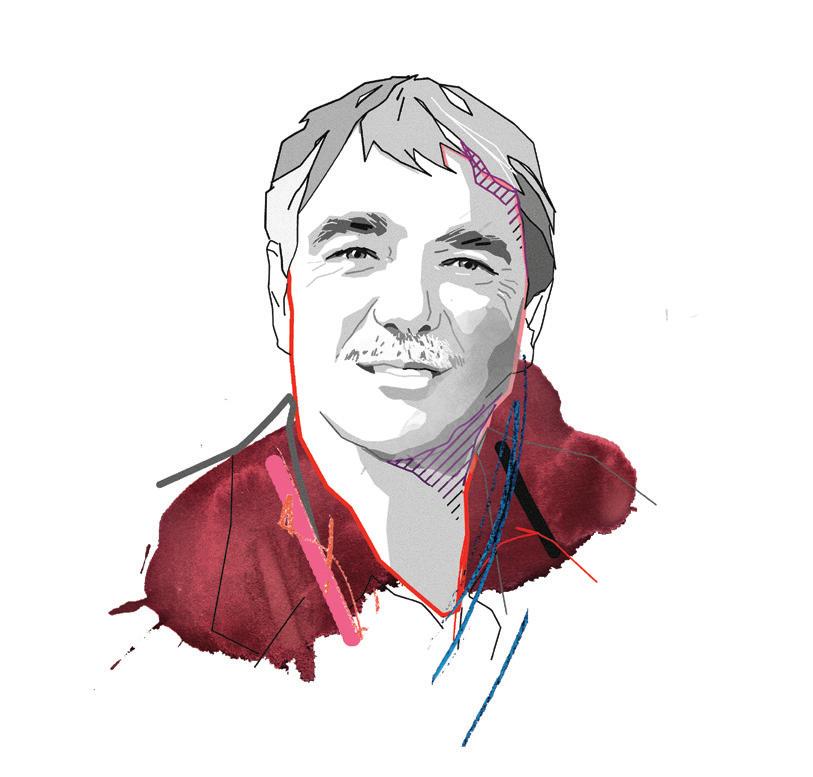
With wages generally high, benefits much higher (universal health care, a minimum 35 paid days off per year, just for starters), and strong worker-protection laws, there is considerable motivation to stay in the job lane. Yes, they just raised the retirement age from 62 to 64 (and the unrest from this is ongoing, I can tell you from personal experience), but overall, it’s a pretty worker-friendly environment.
Entrepreneurs, of course, get none of the above.
“I have things that need tending to every day,” noted independent farmer Robert Gordon. “For me, a day off is a day with no revenue.”
Even someone who is willing to work more hours and days still must contend with all those who are not, ranging from government offices to suppliers to customers. Plus, all the benefits that workers receive by law create high costs for business owners, potentially a debilitating problem for a startup.
Which makes it ironic that “entrepreneur” is itself a French word. Current French President Emmanuel Macron is very pro-entrepreneur and is increasing government programs and funding to support more opportunities. In this context, the situation seems poised to improve considerably.
For example, Credit Agricole, the nation’s largest bank, has established an incubator hub called Le Village, offering a wide variety of training, services and workspace. Program participants are also connected with the bank’s large clients.
Perhaps the centerpiece of the rising French entrepreneurial wave is a massive new incubator facility in Paris called Station F. Created and funded by Xavier Niel, one of the richest people in France, it covers 366,000 square feet in three connected buildings. French media, in their typically restrained fashion, have named it “the best in the world” for startups.
The focus is very much on the tech sector. The majority of France’s tech firms have a presence there. They in turn provide potential entrepreneurs with everything from technology training to introductions to future tech and the attendant opportunities. A fabrication lab supports prototype development.
Station F’s flagship program is Launchpad, which brings an idea from concept to operating business in nine weeks. Along with all the startup aspects, the program includes direct connections to investors and even potential customers.
For French businesses ready for international expansion, Fernanda Arreola, a professor of entrepreneurship, pointed out that French is the national language in other countries, like Belgium and Switzerland, which are adjacent. “These are obvious opportunities, especially during a startup’s early months and years,” she suggested.
Clearly, key players in France see this as a time of entrepreneurial opportunity, and given our area’s centuries-old ties with that nation, perhaps that means opportunities for local businesses to find new partners and markets. T
20 BIZ NEW ORLEANS AUG 23
IN THE BIZ ENTREPRENEUR
ILLUSTRATION BY PADDY MILLS
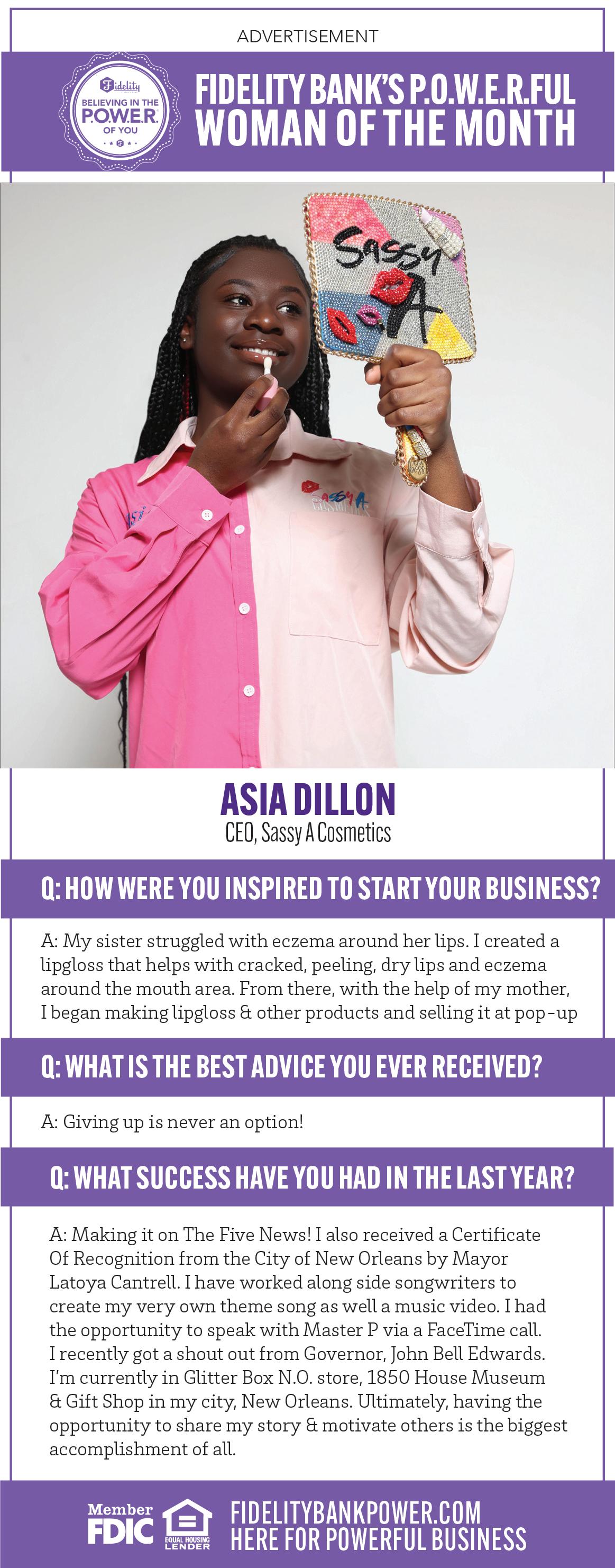

21 BIZNEWORLEANS.COM
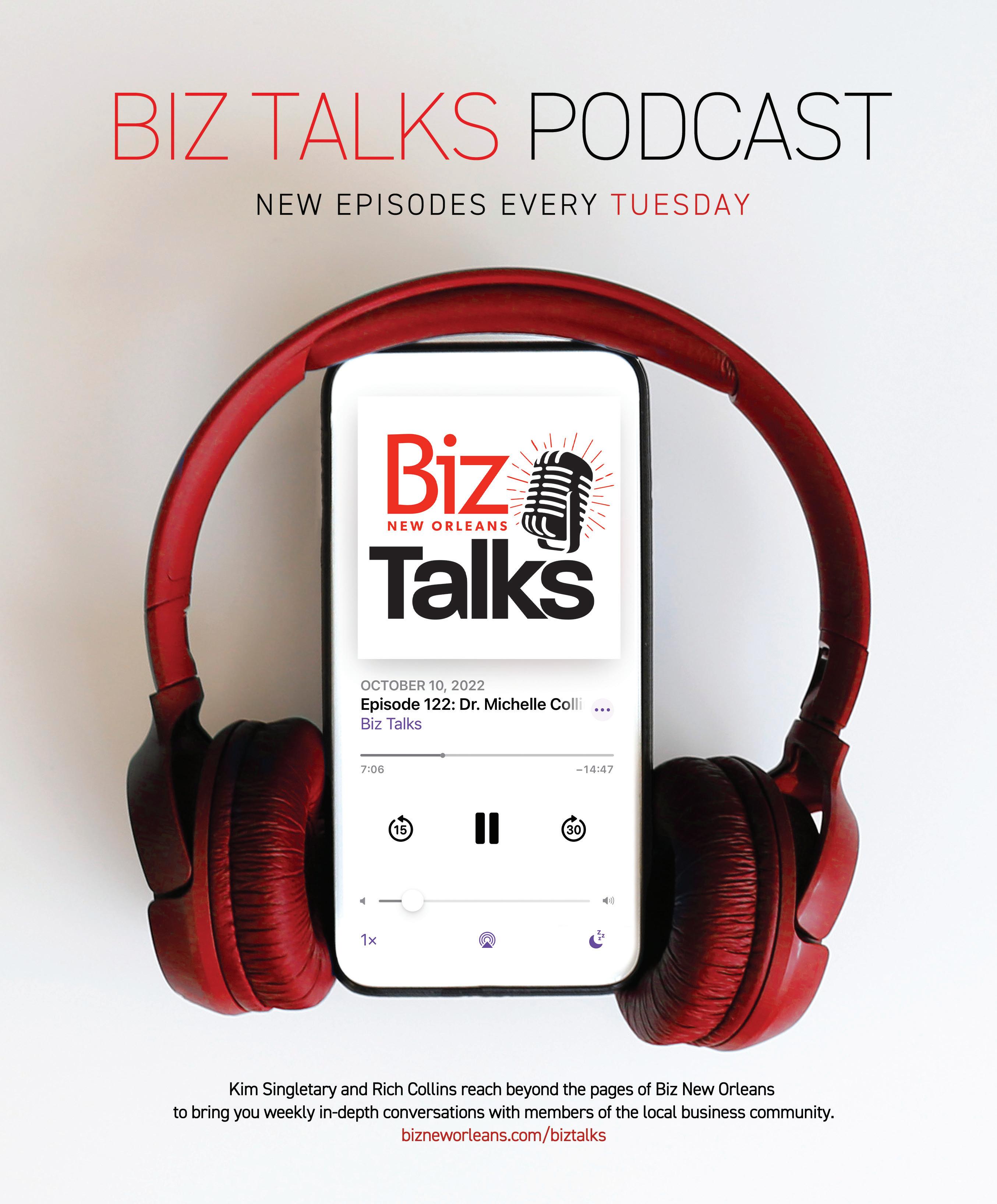
PERSPECTIVES
24
HEALTHCARE
MD Anderson
President: “There’s never been a moment like this in oncology.”
26
REAL ESTATE+ CONSTRUCTION
New Orleans has the opportunity to be a leader in fighting the effects of climate change.
32 ECONOMIC DEVELOPMENT
As Louisiana embraces a move toward clean energy and higher paying industries, GNO, Inc., is paving the way to success.
34 GUEST
It’s vital for our technology industry that we recruit Louisiana’s underprivileged youth.

TECH
Diversity is a must in the New Orleans’ tech industry.
28
OCHSNER PARTNERS UP
MD Anderson President: “There’s never been a moment like this in oncology.”
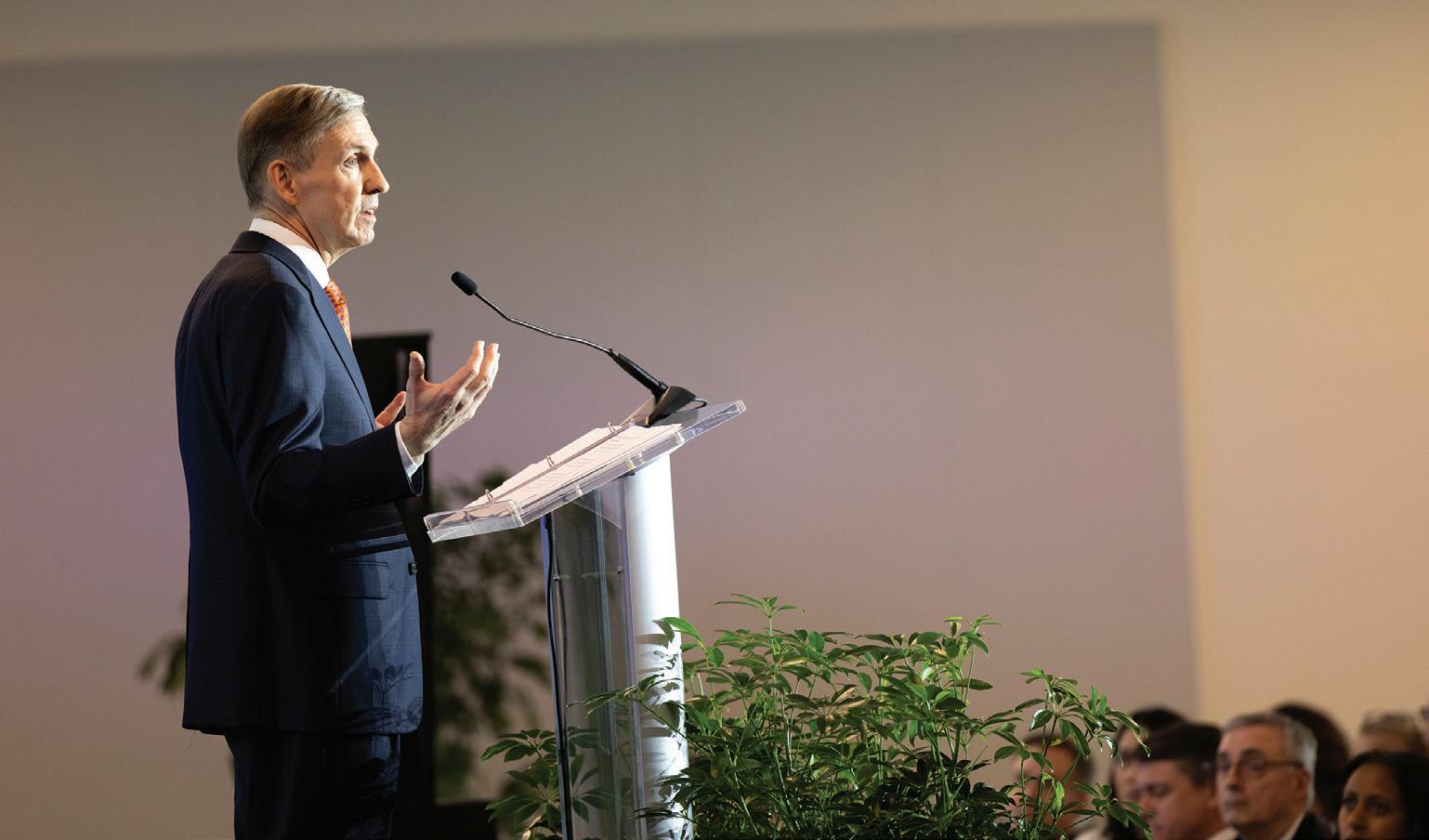 BY RICH COLLINS
BY RICH COLLINS
time you used a browser and you realized, ‘My life is changing.’ When you use artificial intelligence with medicine, and with oncology care, amazing things are going to happen. The way we deliver care will change. The way we do diagnostics will change. The way we document what we do will change in ways that none of us can even imagine. So the next 10 years are going to be incredible because of research and the changes that are happening in cancer therapeutics.”
Pisters told the crowd that their new colleagues in Houston were just as excited about this new partnership that will bring MD Anderson-endorsed care to patients throughout the region.
“I speak for my 24,000 teammates at MD Anderson who are cheering right now in Houston as we send out a simultaneous message to our workforce announcing this partnership,” he said. “I know that people will be watching us from around the country and from around the world as they see partnerships like this that really represent what is best in America.”
At the event, Ochsner and MD Anderson announced plans to create the Ochsner MD Anderson Cancer Center at seven Ochsner campuses in Louisiana.
Ochsner is the largest health system in Louisiana and the state’s largest private employer. MD Anderson is a comprehensive cancer center based in Houston and with partners worldwide.
Peter WT Pisters, president of the MD Anderson Cancer Center, said his hospital’s partnership with Ochsner Health comes at a time of unprecedented breakthroughs in cancer research and treatment.
“There’s never been a moment in time like this in oncology,” he told a crowd assembled for a June 22 press conference at the the Gayle and Tom Benson Cancer Center at Ochsner’s main campus in Jefferson Parish. “Through science, through research, through the molecular understanding of cancer, we’re in an era right now like no other.”
Pisters cited CAR T therapy, a promising type of immunotherapy, as an example. Ochsner doctors are among those using the relatively new treatment with success.
“Just 15 years ago, at an event like this, people would be saying to each other, ‘Why is it that the immune system doesn’t recognize the first cancer cell? Why can’t we program the immune system to fight cancer?,’” said Pisters. “Well, the good news now is that we can.”
Pisters said the emergence of artificial intelligence is going to be another game changer.
“We’re all going to remember the first time that we used chat GPT,” he said. “It’s like the first
As a result of this new partnership, which has been in the works for three years, Ochsner will be the only provider in Louisiana with a cancer program based on MD Anderson’s standards and treatment plans. Financial details of the partnership are confidential, but it “will be a full clinical and operational integration of the delivery of cancer care,” according to Brian Moore, medical director of the new endeavor. He said the seven sites are co-branded locations that have a “fully integrated cancer program based on MD Anderson’s standards of care and treatment plans.”
Each member of the new center’s team of cancer physicians has been certified by MD Anderson to clinically practice as part of the co-branded Ochsner MD Anderson cancer program. Appointed physicians can become adjunct members of MD Anderson faculty. T
24 BIZ NEW ORLEANS AUG 23 PERSPECTIVES
HEALTHCARE
DID YOU KNOW? MD Anderson is named after Monroe Dunaway Anderson, a partner at the world’s largest buyer and seller of cotton in the 1930s. The $19 million foundation funded upon his death was used to create the cancer center in the 1940s.

DID YOU KNOW? According to an Oct. 28, 2021 article from the World Resources Institute, ecosystem restoration creates 3.7 times as many jobs as oil and gas production per dollar.
Using Nature to Fight Nature
Since its founding in 2001, the Urban Conservancy has promoted sustainable solutions to New Orleans’ distinct land use needs through community and K-12 education and neighborhood-level engagement.
While hopes are to help mitigate some of the larger aspects of climate change, many of the solutions are much more immediate and practical — like storm-water management.
“By reducing the volume of water our pumping system must manage, particularly in the first hour of a rain event, we can drastically reduce our city’s collective carbon emissions,” Eness said. “Through the implementation of nature-based solutions, we enable water to soak in where it falls, reducing the amount of water that makes it into our streets, catch basins, and ultimately our pumping systems.”
DANA
ENESS
Executive Director The Urban Conservancy
BY DREW HAWKINS
Eness said New Orleans has committed, at least on paper, to addressing climate change. She pointed to a sentence that appears in bold font early in the city’s 2022 update of its climate action plan, “Net Zero by 2050: A Priority List for Climate Action in New Orleans.” It reads: “Now is the time for New Orleans to accelerate our action on the climate crisis and create opportunities in the new economy for our city.”
New Orleans lies on the frontlines of the climate crisis. Rising temperatures and sea levels mean the city will experience some of the impacts long before other places — in many ways it already is.
One potential solution lies in green infrastructure.
Green infrastructure is a broad term that describes a strategically planned network of natural and semi-natural areas with other environmental features, designed and managed to deliver a wide range of ecosystem services — while also enhancing biodiversity. These networks improve the quality of the environment, the condition and connectivity of natural areas, and improve people’s health and quality of life.
“Green infrastructure also fosters biodiverse ecosystems, which play a crucial role in climate change resilience. They can absorb and store significant amounts of carbon dioxide, a greenhouse gas contributing to climate change,” said Dana Eness, executive director at the Urban Conservancy. “Protecting and restoring biodiversity in New Orleans can contribute to mitigating climate change effects and improving the city’s overall resilience to its impacts.”
Another organization working in the city’s green sector is Green Coast Enterprises, which was founded in 2007, a time when a focus on green and sustainable real estate development was a fringe idea.
While Green Coast is best known for its real estate development projects, most of the company’s work is helping other building owners to be more energy and water efficient. The company has provided energy management services to charter schools, affordable housing developers, and directly to the City of New Orleans for over a decade.
For CEO Jackie Dadakis, it’s not just a niche service. It’s a long-term solution. “Thinking about how to make our built environment more energy and water efficient is an important part of how we make it affordable to live here long term,” she said.
Dadakis stresses sustainability is a gradual process and counts the new energy efficiency building code that went into effect on July 1 this year as a win.
“Now every new building and substantial renovation will be achieving substantial savings for occupants,” she said. “You layer this with investments making our buildings stronger in the face of hurricanes and we will see insurance costs and utility bills coming down together.” T
Significant challenges to scaling up nature-based solutions remain, and one of the biggest challenges is a general lack of awareness of what exactly nature-based solutions are and how they can address common problems, like urban flooding and extreme heat. Researchers estimate that nature-based solutions — when welldesigned and managed — can cost-effectively provide over one-third of the climate mitigation needed to stabilize warming to below two degrees Celsius by 2030.
JACKIE DADAKIS CEO Green

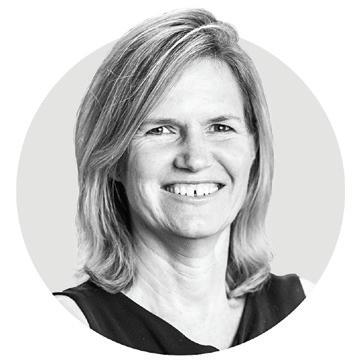
Coast Enterprises
We continue to make important investments in our sewerage and water boards systems and the Entergy grid. I want to see us continue to prioritize investments that make those systems more resilient, like micro grids to ensure power stays on at key nodes during major storms.
26 BIZ NEW ORLEANS AUG 23 PERSPECTIVES REAL ESTATE + CONSTRUCTION
New Orleans has the opportunity to be a leader in fighting the effects of climate change.



27 BIZNEWORLEANS.COM
DID YOU KNOW? According to Louisiana Economic Development, since 2006, Louisiana has created more than 20,000 tech-sector jobs by attracting more than 45 high-tech companies.
TE(CH)TOUFFEE
Diversity is a must in New Orleans’ tech industry.
BY DREW HAWKINS
Ask anyone off the street what it is that makes New Orleans special and chances are some will say the music or the food. Others will say the culture. Very few will say the weather, and none will say the roads. But every answer you get will have one common factor: Everything that makes the city unique comes from a blend of different people and cultures.
Over the past decade, New Orleans has been making its mark in another realm: the tech industry. It’s also been a space where people of color are seriously underrepresented. This isn’t a problem unique to the Big Easy. In the tech sector nationwide, 68% of jobs classified as “professional,” which includes jobs such as computer programming, and 83.3% of “executive” jobs, which encompass the highest level jobs in the organization, are held by whites — and 80% are held by men.
The tech industry offers high-wage, high-demand jobs, and significant economic opportunities and advancement. But there are barriers that prevent underrepresented talent from getting hired in these roles. Companies like Google and IBM recognize this and are addressing these challenges by using a skillsbased approach to hiring by dropping the

28 BIZ NEW ORLEANS AUG 23
PERSPECTIVES TECH
PHOTO COURTESY NOEW


29 BIZNEWORLEANS.COM
requirement for four-year degrees. Companies understand that applicants’ skills and abilities are often more important than their degreebased credentials.
Although companies around the world have made DEI (Diversity, Equity and Inclusion) a priority for their employees, some in the industry say the conversation needs to be shifted from diversity to accessibility. As more minorities and people of color break into the tech sector, the industry thrives. But removing the barrier of entry is key.
“Addressing accessibility in technology for underrepresented talent requires an intentional and concerted effort in the ecosystem around employment, retention, and advancement — building a sustainable pipeline from entry to exit,” said Sabrina Short, founder and CEO of NOLAvate Black, a talent sourcing and recruitment agency for “companies committed to building dynamic teams with BIPOC (Black, Indigenous, People of Color) talent.”
NOLAvate Black, in partnership with GNO, Inc and Lucid, conducted a talent survey in 2021 with over 500 BIPOC aspiring technology professionals to learn about the challenges they face entering the technology sector. The results showed that talent not only needed access to training and resources to upskill but also opportunities to get hired in entry-level roles, apprenticeships and paid internships to get experience — landing that first job is a challenge for new underrepresented technology talent.
“Accessibility looks like transparency around salary to support pay equality,” Short said. “Communicating a clear process around recruitment and hiring. Removing bias from advancement opportunities within the company, including fair and transparent evaluation processes. A fiscal commitment and accountability around building a safe, inclusive and equitable work culture.”
Companies that make diversity and inclusion a priority show that they value individuals from different backgrounds, experiences, perspectives, and expertise, Short said. It fosters creativity, promotes innovative thinking, and more effective problem-solving, resulting in improved product development, increased profitability, higher productivity and overall better performance compared to homogeneous organizations.
To help address accessibility in technology, NOLAvate Black organized the Inclusive Tech South Foundation (ITSF), which strives to
build a skilled and equipped workforce guided by principles that include what Short called “inclusive innovation.” The idea is that diversity — meaning representation across various backgrounds, cultures, races, gender and regions — offers experiences and perspectives that ultimately produce the best technology, stronger, more resilient communities, and overall economic sustainability. Inclusive Tech South Foundation is an extension of NOLAvate Black’s mission to build a network
of technology professionals to change the culture of tech.
To that end, some companies are working to make space for Black professionals — literally. Maroon co-working space in the Lower Garden District serves as an incubator to support startups and small businesses. President, CEO and co-founder Dr. Jawan Brown-Alexander said that while New Orleans is among the top cities over all when it comes to creating tech opportunities, the city is still not where it should be in terms of introducing the entire tech ecosystem in the Black community and women.
“I think it is important to have conversations about the broad scope of tech and how we can continue to make tech more relatable, more community-minded, and more accessible to Black people and other people of color,” Brown-Alexander said. “Community-minded tech organizations, interested in increasing the number of minorities in the tech industry, must continue to connect the dots in terms of being intentional about building diverse tech startup teams. This alone has a direct impact on generational wealth in the Black community, particularly when tech companies exit through IPOs, acquisitions and mergers.”
Brown-Alexander echoed Short’s sentiments about the need for a concerted effort to make the industry more accessible, saying the ecosystem must also persistently break down barriers to funding, resources and support for tech startups and disadvantaged businesses. “We see all things with an equity lens. Equity is the just and fair inclusion into a society in which everyone can participate and prosper,” Brown-Alexander said. “Data shows that Louisiana has work to do when it comes to providing equitable solutions.”
For Brown-Alexander, diversity is an important driver of economic development, and is critical to the tech small business sector. She said creativity and innovation are directly connected to diversity and inclusion.
While more work needs to be done as it relates to DEI, agencies like NOLAvate and companies like Maroon are making headway and opening up the local tech industry for more people — more people with more ideas to bring to the table. But there is more to do.
“There are opportunity gaps that exist between minority tech professionals — as well as aspiring minority tech professionals — and their counterparts,” Brown-Alexander said. “Collectively, we must work to fix this issue.”T
30 BIZ NEW ORLEANS AUG 23
”
“
Community-minded tech organizations interested in increasing the number of minorities in the tech industry must continue to connect the dots in terms of being intentional about building diverse tech startup teams. This alone has a direct impact on generational wealth in the Black community, particularly when tech companies exit through IPOs, acquisitions and mergers.
Dr. Jawan Brown-Alexander, president, CEO and co-founder of Maroon co-working space

PERSPECTIVE ECONOMIC DEVELOPMENT

All of the Above
As Louisiana embraces a move toward clean energy and higher paying industries, GNO, Inc., is working to pave the way to success.
BY MICHAEL HECHT
several impactful initiatives, including WISE Women, which invites high school girls to connect with female mentors and take tours of facilities that utilize STEM skills, like the NASA Michoud Assembly Facility. Another is the HBCU Innovation Internship Program, which has paired 50 upperclassmen from Dillard, Xavier and Southern universities with local startups and tech companies over the past three years, providing ground-level access to the inner workings of the area’s most advanced companies.
This is an exciting moment for GNO, Inc., as we usher in a new wave of opportunities with the potential to not only grow, but transform the regional and state economies.
Louisiana’s legacy of being an energy innovation leader is poised to continue as the state embraces an “all-of-the-above clean energy future.”
Local companies are building and servicing offshore wind projects along the East Coast, using expertise gained working with oil and gas operations. This will prepare the state for offshore wind leases in the Gulf of Mexico this summer. Our H2theFuture initiative, one of the most forward-thinking energy initiatives in the nation, will help catalyze research, training, startup incubation, and other key elements needed to deploy clean hydrogen across South Louisiana.
These are just two of the many initiatives under GNO, Inc.’s “all of the above” energy strategy.
Preparing our residents for high-growth, high-wage careers is a major priority. GNO, Inc.’s workforce development team creates partnerships that deploy impactful training in the region, yielding nearly two dozen GNOu programs to align the needs of local industry with the capabilities of education and training providers. This work is aided by the GNOu Summit, a conference that convenes human capital, education, and training leaders from across Southeast Louisiana to share trends, best practices and impacts.
Before training and hiring can take place, the region’s future workers must be guided into the right career pathways. The GNO Career Guide does this by highlighting leading opportunities found in Greater New Orleans, and offers a matchmaking tool that pairs the skills and abilities of students and young adults with occupations that take advantage of those traits.
GNO, Inc., also operates as the state’s Region One Center for STEM, or GNO Rocs, which exposes students to STEM careers through
Finally, growth of the region’s entrepreneurship ecosystem has been strengthened over the past few years by several new programs. Eighteen months ago, GNO, Inc., launched StartupNOLA.com, an online highlight reel of the local ecosystem that features the support organizations and startups in Greater New Orleans. Later this summer, updates to the site will help connect users with local ecosystem events and university research programs around the region. As one of the certified participants in the state’s Small Business Credit Initiative (SSBCI), GNO, Inc., will be making equity investments in regional startups over the next several years.
Two key initiatives are also aimed at fostering inclusive innovation. GNO, Inc.’s Startup Noir NOLA is launching a website later this summer to highlight the output of high-growth startups launched by Black entrepreneurs and help promote funders, support services and legislation focused on supporting Black founders. GNO, Inc., is also working with OHUB to create the New Energy Technology Incubator, which supports new energy startups created by minority founders.
These are just some of the ways that GNO, Inc. is working to create a region with a thriving economy and an excellent quality of life, for everyone. Success will be the creation of a robust, accessible and growing middle class in Southeast Louisiana where our children and grandchildren can live and prosper.T
32 BIZ NEW ORLEANS AUG 23
MICHAEL HECHT is president and CEO of Greater New Orleans, Inc., the economic development agency for Southeast Louisiana. He may be reached via email at mhecht@gnoinc.org.
ILLUSTRATION BY S.E. GEORGE

PERSPECTIVE GUEST DAVID SHAPIRO is a director with Ochsner Health and board president of NorthShore Robotics. He may be reached via email at BoardPresident@NorthshoreRobotics.org
Empowering the Future
It’s vital for our technology industry that we recruit Louisiana’s underprivileged youth.
BY DAVID SHAPIRO
fostering diversity and driving economic growth in our region.
THE CYCLE OF INEQUALITY: In Louisiana, educational challenges contribute to disparities among these young people, limiting access to quality education and hindering professional opportunities. This is especially evident for employers in South Louisiana when educating, recruiting and supporting these youth in the technology industry. Both my teams actively work toward breaking the cycle of inequality.
At NorthShore Robotics, we recognize the potential of young people to thrive in the IT field, providing a pathway for social mobility. By investing in their education, training and professional development, we create a more inclusive society where talent and merit determine success, rather than socioeconomic background. My team at Ochsner Health works with internal recruiters and organizations like the RootedSchool to identify underprivileged youth, ensuring job opportunities are known and available to everyone in the region.
unique experiences, backgrounds and perspectives into the technology industry.
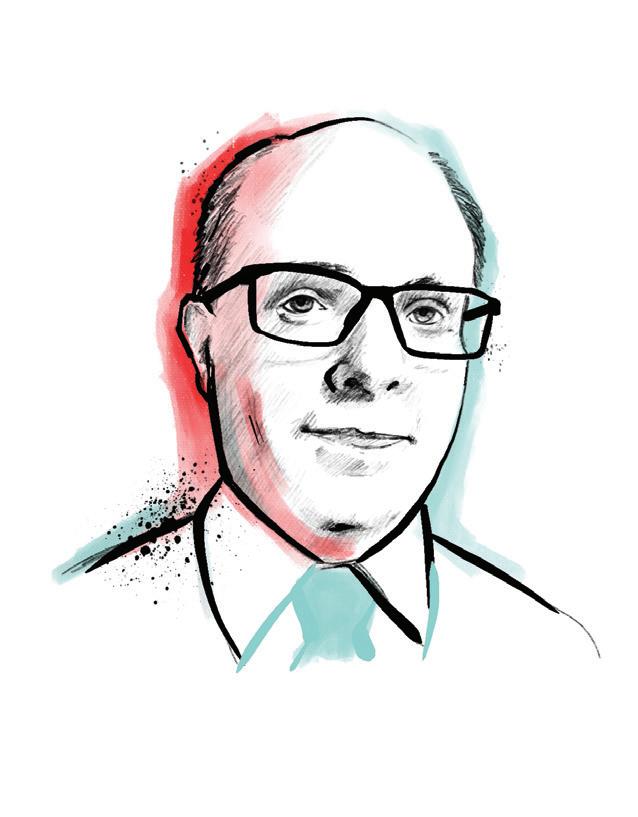
Within Ochsner Health, we recognize the power of diversity to drive innovation. By fostering an inclusive work environment, we create opportunities for everyone to contribute to the organization’s success and positively impact patient care and health outcomes. At NorthShore Robotics we are building the future of our tech industry by expanding access to quality education related to the jobs of the future. Ochsner Health D&I leaders and NorthShore Robotics have even partnered to ensure we are reaching areas of the population that do not have access to STEM education programs.
As a director with Ochsner Health and a STEM nonprofit leader as board president of NorthShore Robotics, I oversee hiring entry-level IT professionals at Ochsner Health. This experience has taught me the critical importance of recruiting and empowering underprivileged youth in the tech industry.
With NorthShore Robotics, I work with a team that brings STEM education and life skills to the greater New Orleans region. Louisiana’s unique educational landscape presents both challenges and opportunities in bridging the opportunity gap for these young individuals. In my work I emphasize the significant benefits of involving underprivileged youth in the tech sector, highlighting the importance of breaking the cycle of inequality, closing the digital divide,
DIGITAL DIVIDE: The digital divide is particularly pronounced in Louisiana, where underserved communities face limited access to broadband internet and technology resources. When our recruitment, mentorship and training of these young people provides them with the necessary support and resources, we contribute to closing the digital divide. At NorthShore Robotics, we are committed to partnering with our allied sponsors like T-Mobile, Walmart.org and Ochsner Health’s Diversity and Inclusion Council, along with our local officials to improve and expand access to technology. Equipping youth with the tools and the skills needed to thrive in the digital age, we empower them to overcome barriers and ensure equal opportunities for all.
DIVERSITY AND INCLUSION: As a leader responsible for hiring entry-level IT professionals, I understand the value of diverse perspectives and inclusive teams. Actively recruiting professionals from diverse communities and educating underprivileged youth, we bring their
DRIVING ECONOMIC GROWTH: Recruiting diverse and underprivileged youth in tech not only empowers individuals but also uplifts communities and fuels economic growth. By hiring young professionals at Ochsner Health, we contribute to Louisiana’s socioeconomic development. The skills and knowledge they bring to the organization have a ripple effect, expanding our recruiting market, and stimulating the local economy. NorthShore Robotics investment in young people multiplies the future prosperity and stability of both individuals and the community at large.
Recruiting and serving youth in the tech industry is crucial for both societal progress and organizational success. By breaking the cycle of inequality, closing the digital divide, fostering diversity and inclusion, and driving economic growth, we create a more equitable and innovative future. As a leader in this industry, I am committed to working toward a future where all youth in Louisiana have equal opportunities to thrive in the tech industry. Let us join forces, gear kids up for success, unlock their potential and shape a better future for Louisiana. T
Disclaimer: The opinions and views expressed in the article are the author’s and do not necessarily reflect the views or positions of Ochsner Health or NorthShore Robotics.
34 BIZ NEW ORLEANS AUG 23
ILLUSTRATION BY S.E. GEORGE
New Orleans 500 Influential, Involved and Inspiring Executives
The New Orleans 500, an annual publication from Biz New Orleans magazine, profiles the business leaders who are driving the greater New Orleans economy today and making decisions that will shape the region’s future. The book is overflowing with details about regional CEOs, presidents, managing partners, entrepreneurs and other executives who are as devoted to their professions as they are to civic affairs. It’s a diverse group that includes fourth- and fifth-generation owners of family businesses as well as young, social media-savvy entrepreneurs building their brands one like or follow at a time.

ORDER TODAY BIZNEWORLEANS.COM
2023 EDITION
 Natalie Barranco, co-founder of Prime Business Advisory Solutions, offers her
Natalie Barranco, co-founder of Prime Business Advisory Solutions, offers her
top tips for finding success in today’s changing marketplace.
LOOKING TO BECOME MORE EFFICIENT AND PROFITABLE?
BY KEITH TWITCHELL PORTRAITS BY EDMUND D. FOUNTAIN
NATALIE BARRANCO has made a successful career out of helping businesses be successful.
Barranco is the co-founder of Prime Business Advisory Solutions, a firm that provides executive-type services and expertise such as financing and accounting, internal operations and processes, marketing, and strategic planning to businesses looking for guidance.
A diverse professional background, including positions in the tourism, transportation, retail, public health, accounting, education and construction industries, enables Barranco to identify universal business needs and priorities while simultaneously grasping the specifics of each client’s particular field.
One key past job was serving as CFO/COO of Hotard Coaches, where she helped package the company for purchase by a private equity firm and then facilitated further acquisitions and mergers, with a particular focus on software conversions and process improvements during the integrative stages. Another was as auditor at the Bourgeois Bennett accounting firm, where she also performed tax work, managed staff, and provided consultations to the variety of businesses the company served.
A West Bank native, Barranco earned her MBA from Tulane University and is also a certified public accountant. She has done extensive volunteer work, and currently serves on multiple area boards, including the New Orleans Chamber and Power of Women.
Biz New Orleans spoke recently with Barranco to get her perspective on the challenges and opportunities that currently facing businesses, and how she recommends businesses tackle them in the present economic climate.
Q: WHAT IS SOMETHING NEW BUSINESS OWNERS OFTEN OVERLOOK WHEN STARTING OUT?
A: We see a lot of energy and focus on the plan for the base function of the business. They have all the key positions identified, the concept is clearly defined, but there is no budget for any marketing or advertising beyond creating a website. Even if the amount is small, you need a marketing budget to get the word out and help promote yourself. You can start small, but you need a plan for how to leverage those dollars in the best way. This could include joining the local chamber of commerce. Additionally, some financing opportunities exist with organizations like JEDCO. There are tremendous amounts of resources available if you just look for them.
Q: WHAT IS SOMETHING ESTABLISHED BUSINESSES OFTEN OVERLOOK?
A: One thing we advise almost all of our clients is to become sale-ready. This does not mean you are going to sell today or this year, but you need to have your business in order to add value to be able to sell. This encompasses policies and procedure documents that capture how your business works in the different areas of accounting, sales, marketing, operations, etc. They would explain how to do the job in that area of the business and what guidelines are being followed. It means job descriptions for your employees. Everything cannot be in your head. That will not help the value of your company, and if something changes or someone leaves the company, that institutional knowledge leaves with them.
Q: WHAT IS ONE CURRENT ISSUE FACING ALL INDUSTRIES?
A: Right now [losing] workforce is plaguing every business. It hurts some businesses more than others because no one knows how to do that person’s job. All the details are in their head and nothing is documented. While this is hitting every industry and all levels of employment, we see this frequently in the accounting and finance professions. There are more jobs than there are people looking to fill them. If the position is not well defined and the role is hard
N 38 BIZ NEW ORLEANS AUG 23

in any way, the new hire will just leave and find another job. New hires must be properly trained and onboarded.
Q: ARE RISING INTEREST RATES A POTENTIAL THREAT TO BUSINESSES?
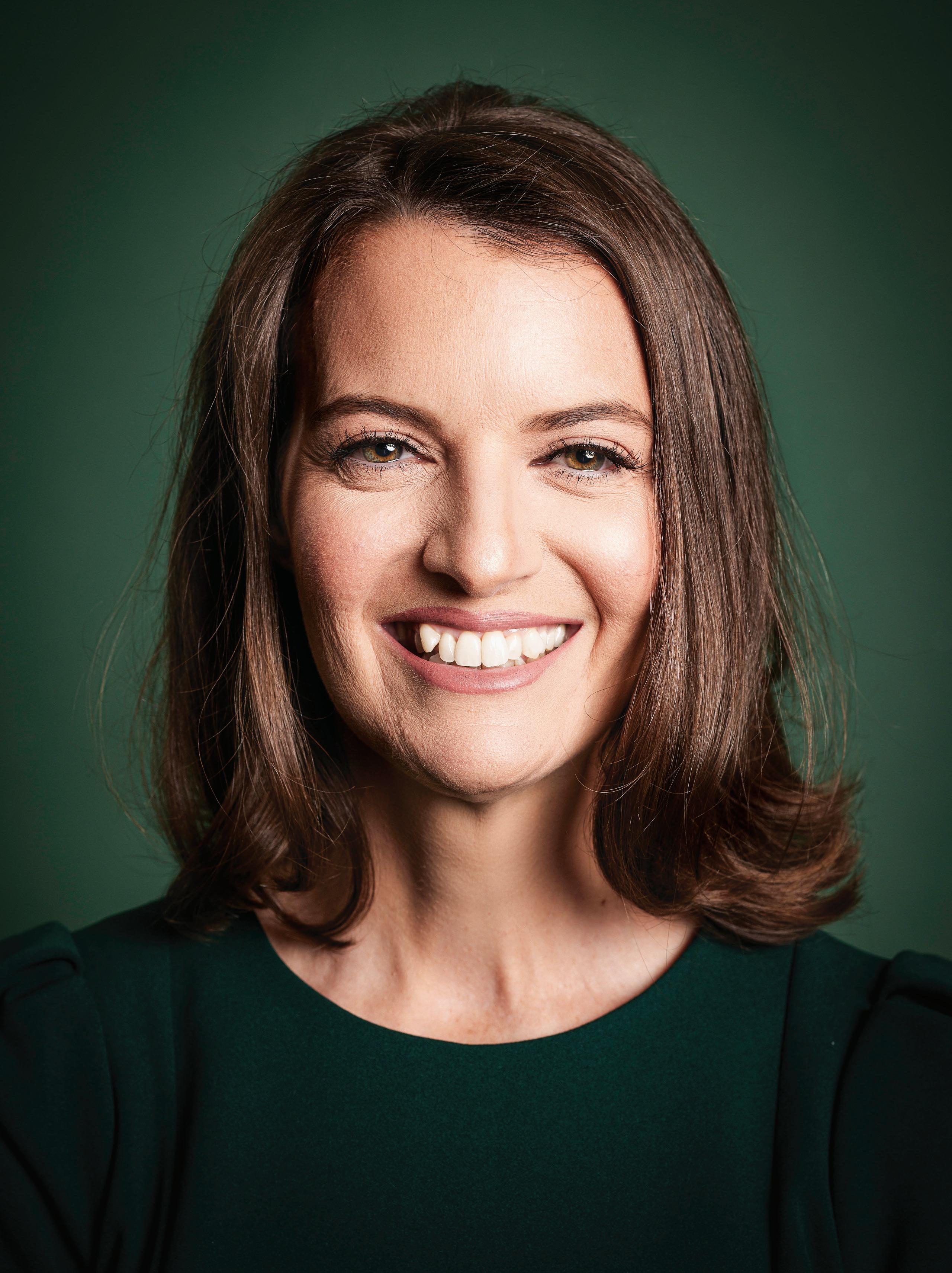
A: Institutions are not lending like they once were. Every institution has a certain amount of funds that are available for lending, and when that pool gets smaller, and the rates are so high, their appetite for risk is very, very small. This limits the availability of funds. You think about a business that has to do regular renovations to their facility, and their scheduled time is coming up, they may not be able to do that. Like in the bus business, you can be on a schedule where
you have to turn over portions of your fleet every year, that might be harder to do. Unfortunately, if some strategies weren’t put into place a while ago, it might be very challenging. We always recommend our clients ask for a line of credit from the bank before they need it, otherwise plans may have to be changed, altered or scaled differently down the road. Look at what’s absolutely necessary to further your business going forward and what it’s going to cost you. Some things may just have to wait, or people are going to have to invest some company funds or personal funds.
Q: WHAT IS A TRENDING TOPIC THAT BUSINESSES SHOULD BE CONSIDERING?
A: Automation and AI programs. Most businesses regardless of size are contemplating automation in their accounting teams, HR teams, operations teams, or marketing teams. Automation can greatly assist companies, but the downfall we see a lot is that the business process has to be efficient before you contemplate automation. If you have an overly complex or tedious process, simply implementing automation will not solve this for you. For other

40 BIZ NEW ORLEANS AUG 23
businesses, adding a business intelligence product for financial reporting is top on their list. CEOs need data to make decisions and they need to see metrics that involve financial data, payroll data, and data from their point-of-sale system. A business intelligence tool can provide dashboards for different types of reports that are built once and then scheduled to run and deliver data to the correct audience. This eliminates the accounting or finance department having to put reports together all month, and gives them the opportunity to analyze and take action on the information in the reports.
It is hard to have a conversation right now without speaking about artificial intelligence. More apps are being created everyday than any person can keep up with. My advice is to pick something and start using it to see how AI will be able to help your business. You need to be cautious with security and understanding if the AI program is one that will use your input to get smarter and to make others smarter, which could also potentially make your company’s trade secrets not secret anymore.
Q: IN TERMS OF GETTING STARTED WITH AI, WHAT ARE SOME OPTIONS THAT OFFER AN EASIER ENTRY POINT WITH THE LEAST AMOUNT OF RISK?
A: There’s a lot coming out right now in the marketing space. AI can be used to create a log, do SEO, make a website. All of those offer easy entry points. The other space that I see a lot of testing is in productivity. Today I tried this tool for meetings that can take notes, write transcripts and pull out action items. We’re playing with that in our internal meetings.
Some people really struggle with a lot of email, so if that’s a pain point for you, I would say look at tools that can help manage your inbox. You have to pick something small, so you can get used to what it’s going to do for you and see how it’s going to help. If it’s easy to learn, and not that complex, it won’t take up that much of your time.
Again, there are still concerns with security, and you don’t want to be part of the generative AI that’s teaching other people your secrets. At our meetings we’re not talking about trade secrets or anything like that, so it’s a very low-risk area for us. It may not be for everybody.
Q: COULD YOU OFFER SOME KEY INSIGHTS FOR A FEW SPECIFIC INDUSTRIES?
A: In the nonprofit industry, we are seeing a need for cultivating younger donors and getting them engaged now. Nonprofits cannot just rely on their development professionals to take on fundraising efforts all by themselves. Board members need to assist in promoting and cultivating new donors and steering committee members must help spread the word of the mission and purpose of their organizations to help engage more people. Business partners must also be called upon for help with promotion.
Our tourism and hospitality industries are back in business, but workforce issues continue to be a challenge. These industries are continuing to focus on employee retention and talent management practices. The more creative businesses can be in providing benefits that speak to their specific employee culture, the more successful these retention efforts are.
For family-owned businesses, we are often seeing the current generation of owners starting to think about retirement, but the next generation is still too young to know what they want to do. This can mean the current ownership is trying to decide if they are going to sell the business or try to keep it, but maybe find someone else to operate as the CEO or day-to-day manager in order to give the next generation a little more time to decide. If the owner can find someone to run day-to-day — an in-house person or a consultant — and transition this responsibility over, this will tremendously help either path, whether that ends up being to sell the business or pass it down.
Q: WHAT ARE SOME CURRENT OR UPCOMING OPPORTUNITIES BUSINESSES SHOULD BE AWARE OF OR CONSIDERING?
A: Sometimes when you can’t build a new location, or scale to another market, you can use the time to really look at your organization and get yourself ready to be able to do that. We call it sale-ready, but it could be scale-ready, it could be just growth-ready. Regardless of what you call
it, it’s a great opportunity to make sure that your processes can support that next thing you want to do. If you want to build another location, or be in another city, all that back-office support has to work for that new location. I think that’s where businesses can consider some automation tools, like accounting software or business intelligence reports. Both do not always take a significant investment, which means in a time like this, I like to work with folks to make their operations as efficient and automated as they can be. A lot of time we find that processes need to be improved in order to fit the automation. When there is an ability to put the investment in, you can build a turnkey operation and go do those things you want to do. Maybe you have also been able to add a little more profit to your bottom line because you got information faster, or with the right mix of indicators, which means you can be nimble and make quick decisions.
Q: WHAT IS THE SINGLE MOST IMPORTANT PIECE OF ADVICE YOU COULD GIVE TO ANY BUSINESS?
A: That’s a hard question because I always want to tell them about 12 things! I feel like a bit of a broken record, but we treat every business like they can benefit from practicing and operating with that sale-readiness in mind. If you have everything mapped out and you’re operating efficiently, you can bring an outsider in to be that CEO or that COO. This increases the value of your business overall to a potential outsider but also just in general because the business is not completely dependent on the person that’s been running it. That’s where a legacy gets built — when someone has really put their mark on a business to be in that position. That’s where we see companies that never thought they would sell, but were able to follow this process and get a price for their business that they didn’t think was possible. A business is much more valuable when you have a track record of someone else being able to sustain that profitability, and, in some case, even grow it. T
41 BIZNEWORLEANS.COM
By Carrie Crockett
TO RAISE OR NOT TO RAISE

IS IT TIME FOR LOUISIANA TO RAISE

RAISE
THE MINIMUM WAGE ?
YOU’VE
ANY FAST FOOD RESTAURANTS OR BIG BOX STORES SINCE COVID-19 RESTRICTIONS HAVE EASED IN THE PAST YEAR OR SO, YOU’VE PROBABLY NOTICED THE SIGNS SEEKING CASHIERS, COOKS, OR DRIVERS OFFERING STARTING WAGES AT $10 OR EVEN $15 AN HOUR–WELL ABOVE THE FEDERAL AND STATE MINIMUM WAGE OF $7.25 .
IN WHAT IS STILL VERY MUCH A
JOB SEEKER’S MARKET, you could look at those for-hire signs and conclude that the market is fixing itself in a textbook example of supply and demand.
There currently aren’t enough willing workers for jobs requiring in-person attendance, especially at the lower end of the pay scale. This has forced companies to increase pay.
“The Great Resignation” had the strongest effect on transportation, accommodation and food sectors, with retail not far behind, according to the U.S. Chamber of Commerce. This left demand for workers in a tourist economy like New Orleans especially high.
In such a market, do we need a mandated increase to the minimum wage? Bill 149, sponsored by Sen. Gary Carter (D-New Orleans) in May, would have established a state minimum wage of $10 per hour beginning in 2024, but it was shot down in a Republican-majority Legislature where the prevailing opinion was that the government should not mandate a wage increase.
“I believe the market is very much taking care of this,” State Rep. Amedee (R) said. “It may be partly due to COVID, but I think it started before that. There were already businesses that had to raise their wages, even if they weren’t paying minimum wage before, just to find steady employees, and COVID made the problem much worse.”
Kevin Pedeaux, owner of local CR Coffee Shop, agrees.
“In New Orleans, I’ve never paid new people — even starting baristas with no experience — minimum wage since I opened in 2014,” he said. “And these are tipped employees I’m talking about. The free market has already pushed up wages to where we’ve had to pay
much more than minimum wage just to keep great people around.”
If the government did mandate across-theboard wage increases, some question what would be accomplished.
“The legal minimum wage doesn’t have a lot of effect on many people in the case when employers are offering more than minimum,” said Professor Walter Lane, chair of the University of New Orleans’ Department of Economics and Finance. “A minimum wage increase would only have an effect if it’s higher than the actual market wage.”

But the New Orleans City Council seemed to think differently in 2021 when it ratified an employee pay plan ensuring all city workers will make at least $15 per hour instead of the federal minimum of $7.25.
When you’re stopped in traffic in front of one of those “for hire, starting pay $10” signs, wasting gas with the A/C on high and a small fortune in groceries heating up in the trunk, you might also ponder how much prices have gone up in the past couple of years. And then consider that the
44 BIZ NEW ORLEANS AUG 23
IF
DRIVEN PAST
federal minimum wage has not changed from its current $7.25 an hour since 2009. That also happens to be Louisiana’s minimum wage by default, along with four other states who also have no mandated state minimum.
In July 2009, when the federal minimum wage was last increased, the inflation rate was -2.097%. Yes, that’s a negative. In March 2020, when COVID-19 hit, the inflation rate was a relatively low 1.5%, not too far off the Federal Reserve’s 2% to 3% goal. However, as shutdowns and labor shortages snowballed, inflation reached its COVID peak in June 2022 at 9.06% — a rate not seen since 1981. It has since been slowly creeping back down. As of June 2023, the rate of inflation sat at 3% — a two-year low.
Prices, however, remain high. According to the Economic Policy Institute, in 2022 the value of the minimum wage was at its lowest since 1956.
“If you just compare the minimum wage now to what it was when I first started in the workforce at $2.50 in the 1970s and adjust the rate to inflation,” Lane said, “it would be around $10 or $11 today just to keep up with inflation.”
This is why 12 states and the District of Columbia, have opted to tie their minimum wage to inflation — but not one of those states is in the South. Still, some Southern states are thriving — even some with the same federal $7.25 minimum wage as Louisiana. So, just how much is a higher minimum wage linked to economic success?

“A minimum wage increase is only one part of growth,” said State Rep. Phelps (D). “We don’t have a skilled workforce. We don’t have companies coming. With all the natural resources we have in our state, all the scenery, all the things Louisiana represents from our culture and cuisine — how could we have done better with all that we have? We talk about lowering insurance and about people not wanting to come to Louisiana,” Phelps
continued. “It all goes together — tort reform, auto insurance, roads, education. We have no control over our weather, but we do have control over trying to get larger companies to come here.”
Professor Erika Zucker, director of policy and advocacy and the Workplace Justice Project at Loyola Law Clinic, has a different take on things.
“If we look at states where people are coming in instead of leaving, where there’s academic achievement, business achievement, where people are thriving, we see that wages have gone up and safety nets have been provided,” she said. “But we rejected a minimum wage increase, paid family leave, expanding benefits and compensation in favor of corporate tax cuts or subsidies to companies to come here. We’re shrinking our tax base because our workers don’t make enough to pay income tax. There’s story after story about college and high school grads leaving the state. People aren’t staying here because they don’t see a future for themselves, and that’s a bleak future for the state.”
According to the most recent U.S. News and World Report’s state rankings, Louisiana is dead last in economy, crime and overall ranking. The state also ranks in the bottom 10 for education, health care and infrastructure. Historically, people have tended to dismiss the entire South as a bloc, but the only other Southern states in the bottom 10 with us are Kentucky, West Virginia and Mississippi.
45 BIZNEWORLEANS.COM
Florida and Texas were in the top 10 for economic opportunity, and Georgia, Tennessee, North Carolina and Virginia were in the top 20 in that category.
Twenty-one states raised their minimum wage in 2021, with Virginia as the only Southern state to do so. Virginia raised it again in 2023, along with Florida. It’s tempting to say that this willingness to increase the minimum wage is helping to put those two Southern states high on the list for economy, but what about the states that, like Louisiana, still have a minimum wage of $7.25 an hour yet are faring much better in economic success measures? Specifically, what about North Carolina, Georgia, Texas and Tennessee? Those states are high on the report’s list for growth and migration into the state, while Louisiana is at the bottom for both.
Yet all have a minimum wage of $7.25.
“Why is Louisiana last in everything?” Lane asked. “When the rest of the South is growing, we’re not.”
For one thing, the poverty rate in Louisiana is the second worst in the nation. In Louisiana, almost 20% of the population lives in poverty, compared to 12.8% in the United States overall, according to welfareinfo.org. But if you also factor in those who fall between the cracks, as does the United Way of Louisiana’s ALICE report, “Fifty-one percent of Louisiana households had income below the ALICE Threshold of Financial Survival in 2021.” This includes both families who fall below the federal government’s definition of poverty ($26,500 for a family of four) and those who are “asset-limited, income-constrained, and employed,” or “ALICE,” as defined by United Way, with an income of $66,288 for a family of four.
“These families don’t earn enough to cover a basic survival budget, but they make too much to qualify for any form of public assistance as defined by the federal government’s programs,” said United Way of Southeast Louisiana CEO Michael Williamson. “They’re working and earning a living — often with more than one job — but still not earning enough to meet their basic needs. The average household in Louisiana doesn’t have $400 in their bank account to weather a crisis such as a major storm event or the loss of a job.”
“We’re below the Southern average,” Phelps said. “There are other Southern states that have raised the minimum wage on their own, like Arkansas, but we’re a state that follows the federal guidelines. I think with the next presidential election, it should be a good time to put forth a new bill in the state. I just hope we get a Legislature at some point that puts the people of Louisiana before businesses and looks at the big picture.”
Looking at the big picture includes taking an honest, hard look at the perhaps unintended consequences of raising the minimum wage by mandate.
“It’s just pure economics,” said National Federation of Independent Businesses (NFIB) Senior State Director Dawn McVea. “If you are doubling the pay of your bottom earner, then you likely would be doubling the pay of your top earner. Clearly, that type of arbitrary impact to labor costs cannot be absorbed by the business, so they will have to pass the cost of that along to customers in the form of higher prices. What makes that incredibly difficult right now is infla-

46 BIZ NEW ORLEANS AUG 23
“SO MANY SMALL BUSINESS OWNERS HAVE ALREADY HAD TO RAISE THE PRICE OF GOODS AND SERVICES TO KEEP UP WITH [INFLATION], ALONG WITH THE HIGHER WAGES THEY ARE ALREADY PAYING TO RECRUIT AND RETAIN WORKERS.”
DAWN MCVEA , NATIONAL FEDERATION OF INDEPENDENT BUSINESSES (NFIB) SENIOR STATE DIRECTOR
tion and the fact that so many small business owners have already had to raise the price of goods and services to keep up with that, along with the higher wages they are already paying to recruit and retain workers.”

“Labor is our biggest expense,” Pedeaux said of CR Coffee. “If they increase the minimum wage, does that mean I need to pay even more above that minimum wage to attract people? The coffee association says independent coffee shops like mine work on a 6.8% margin. Larger companies work on an 18% profit margin, so economies of scale work in their favor. But for me as a small, independent business, when my highest cost, labor, goes up, my prices go up. I’m just moving the numbers accordingly.”
“You can’t just look at a minimum wage increase as being a full gain for the minimum wage earners,” Lane said. “Instead of five workers, a small business might go down to four. Or instead of having a worker take your order at McDonald’s, they’d replace the worker with a kiosk and prices would also increase.”
“I believe if we did mandate a raise in the minimum wage businesses would simply expand the number of self-checkouts they have and lower the number of cashiers,” said Amedee. “They’re not just going to eat their increase in labor costs. Sometimes it means laying off staff. Sometimes it means charging more for their products and services. When that happens, we may have lower-skilled employees who wind up unemployed, and we’ve
also virtually increased the cost of everything they need to pay for on a regular basis.”
“Ninety-two percent of Louisiana small business owners surveyed say they oppose increasing the minimum wage,” an NFIB survey reported from a survey of its 4,000 members across industry sectors in Louisiana earlier this year. “If the wage increased,” McVea said, “67% of our members said they would leave unfilled positions vacant, 60% said they would reduce employee hours, and 58% said they would reduce their number of employees. Most of those would come from businesses with fewer than 500 employees.”
“Additionally, labor statistics indicate that only between 2% and 4.5% of the labor force is impacted by minimum wage,” McVea added, “which further illustrates why this continued debate is really just a moot point. Raising the minimum wage is not a cure-all to improving our state. It is really only a political talking point.”
“The real problem is that we have a lot of people in the state who are not qualified for higher-skilled, better-paying jobs,” Amedee said. “In the 1980s, there still were offerings of trade school credit where you might leave high school at lunch and go to a community college or trade school for pay and a grade. You’d learn a trade like welding, cabinet making, plumbing, becoming an electrician. And then we came into the new millennium, and that virtually disappeared. The big push was to make everybody college ready, but not everybody needs to go to college to pursue their goals, and not everybody will make it in college. Many people are gifted with their hands. I’m very glad to see the pendulum has begun to swing back to the middle a little bit with this. Those not destined for college who’d rather go into a trade have more options now. There’s a renewed focus on community colleges and technical schools, and we’ve even made TOPS money available to tech schools now.”
Jefferson Parish resident Maria Longoria agreed, saying, “Not everyone is cut out for a four-year degree program, but they would shine and would make a great living by going to a trade.” Longoria has worked for decades in warehousing, and she often struggles to find workers with the skills the work demands.
“I was raised in poverty,” Longoria added. “I used to be in Louisiana DECA (a program that prepares high school and college students for careers in marketing, finance, hospitality and management), which allowed me to go to school in the morning then work in the afternoon to help my family and myself with pocket money. It gave me great experience into what the workforce looks like and what the expectations are. That should be just as important a goal as college within the school system.” T
47 BIZNEWORLEANS.COM
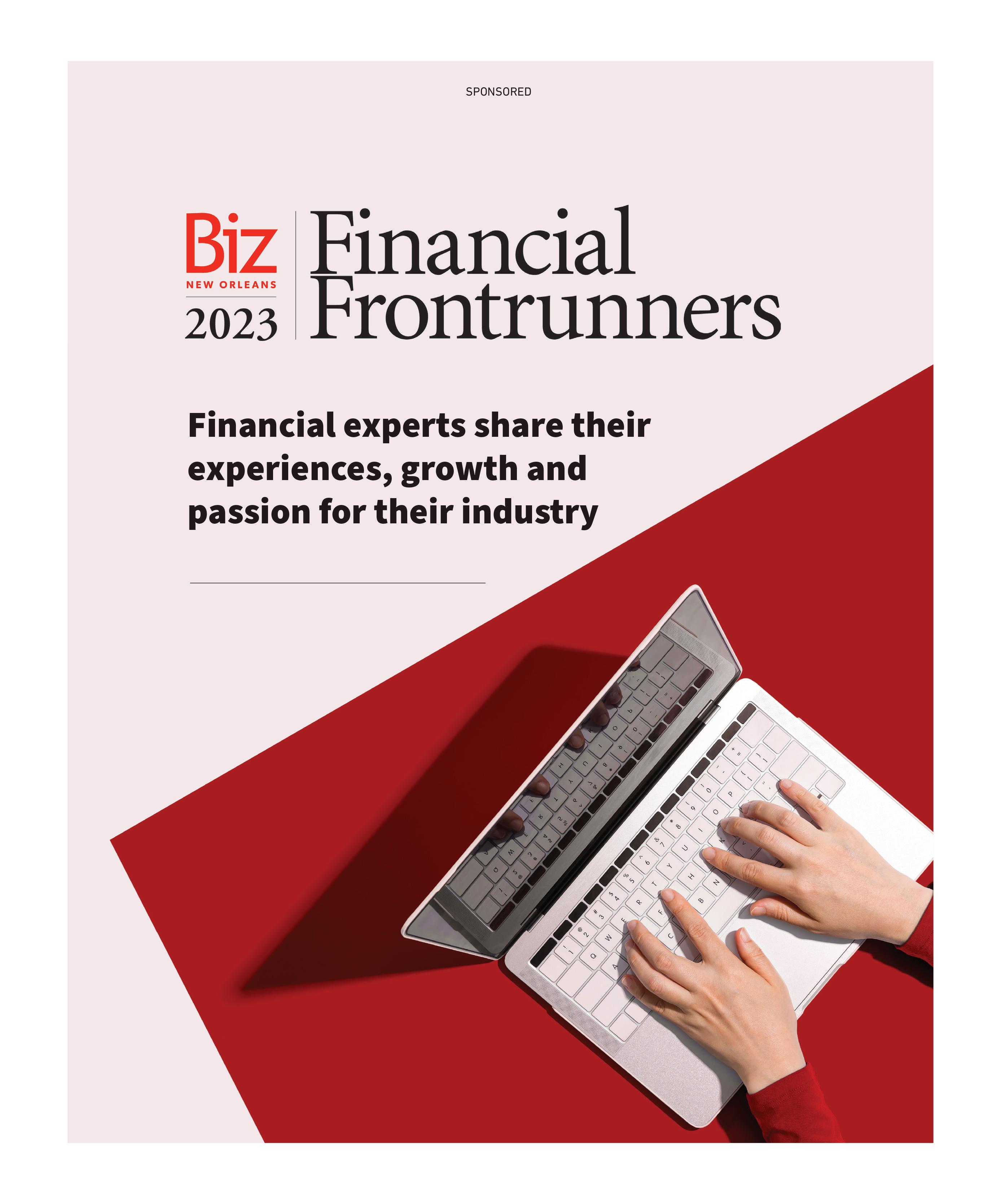
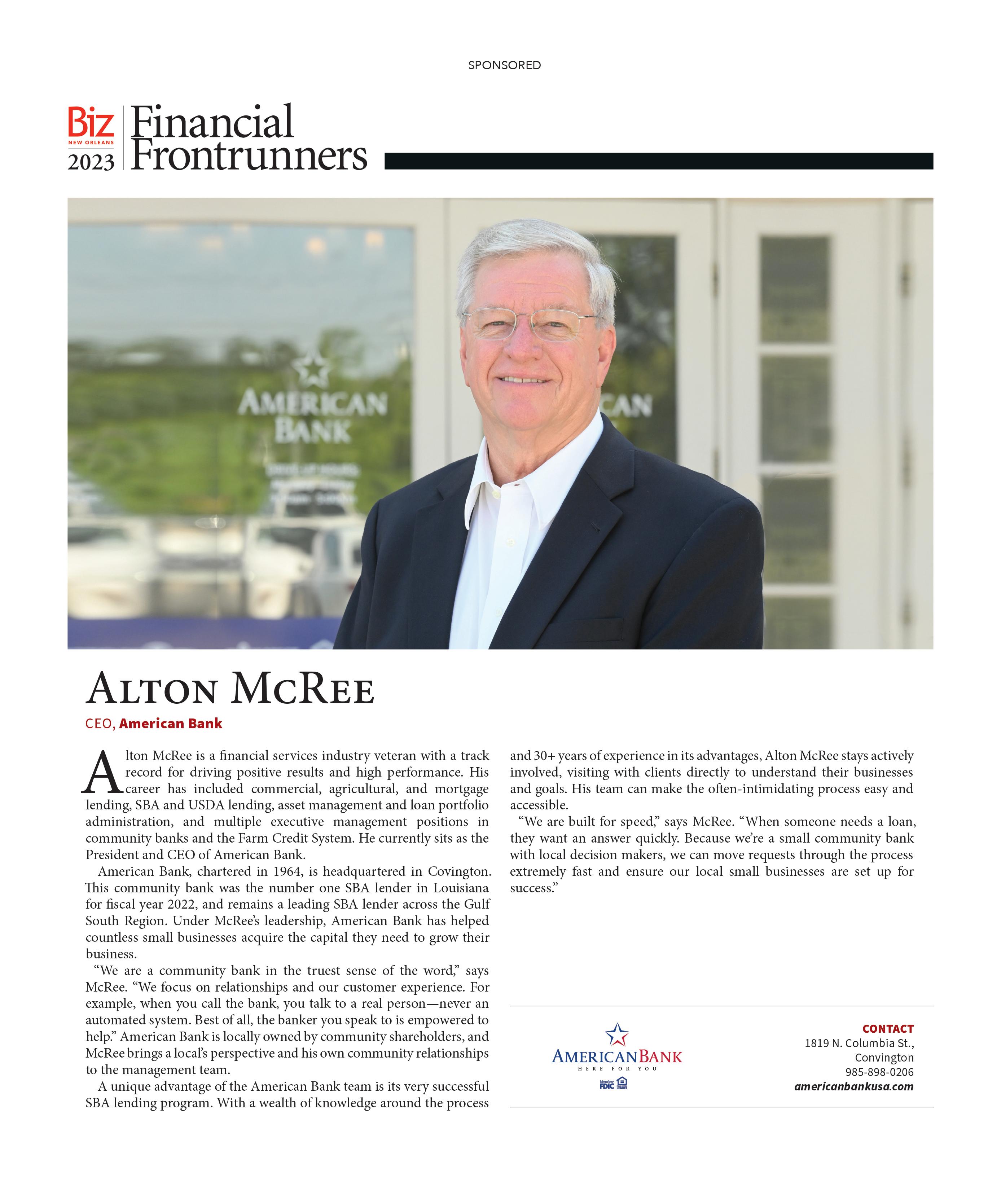
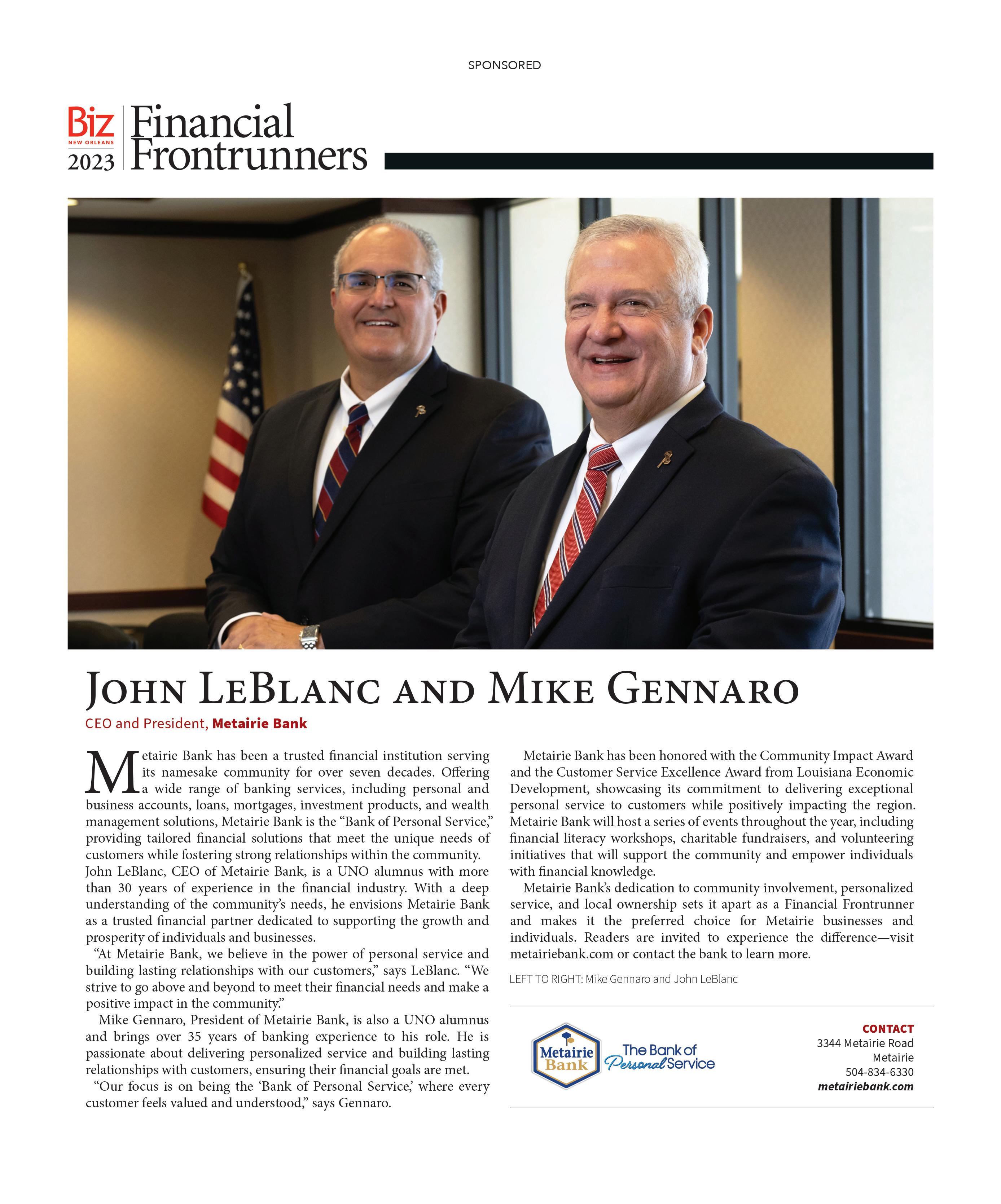
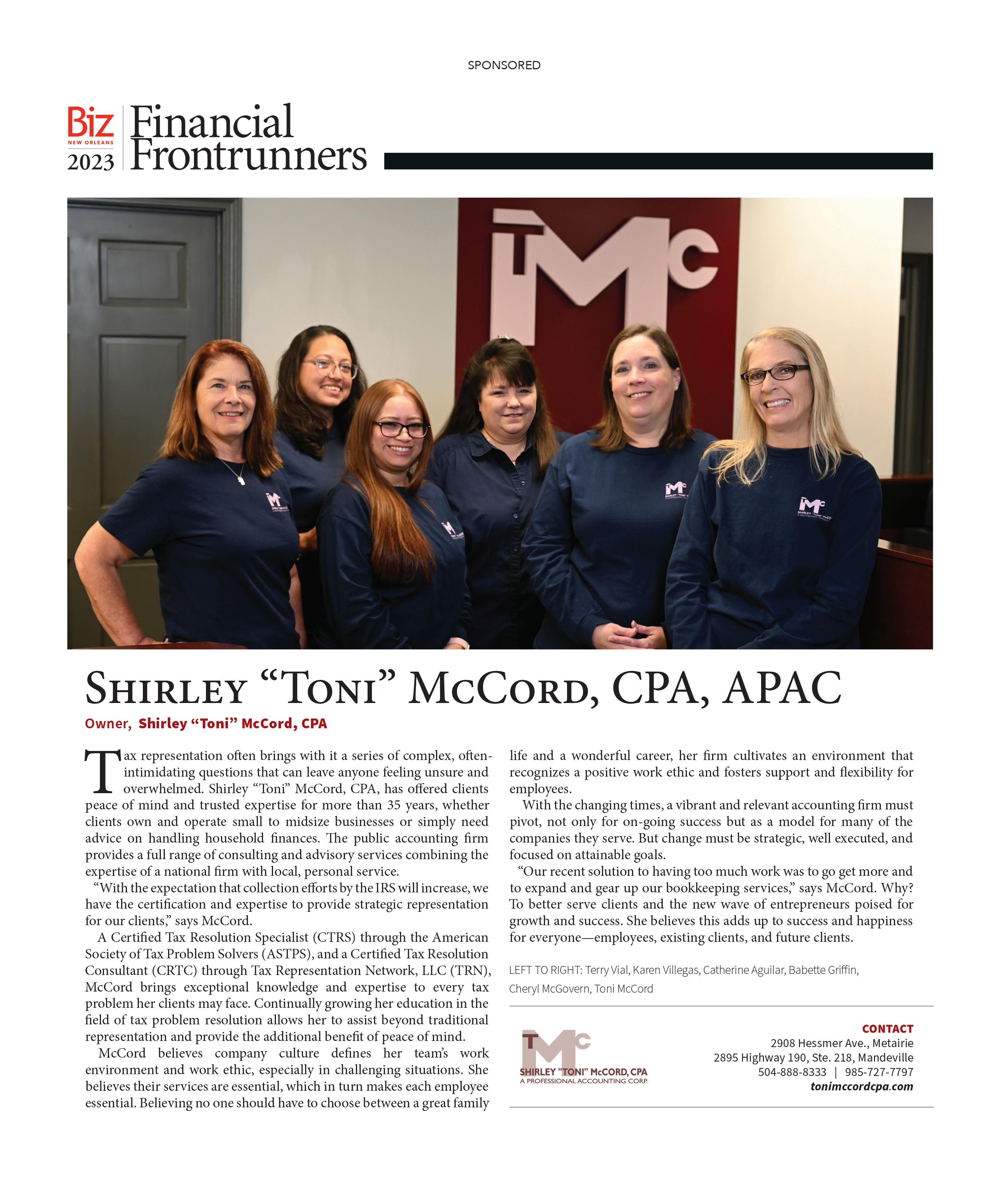
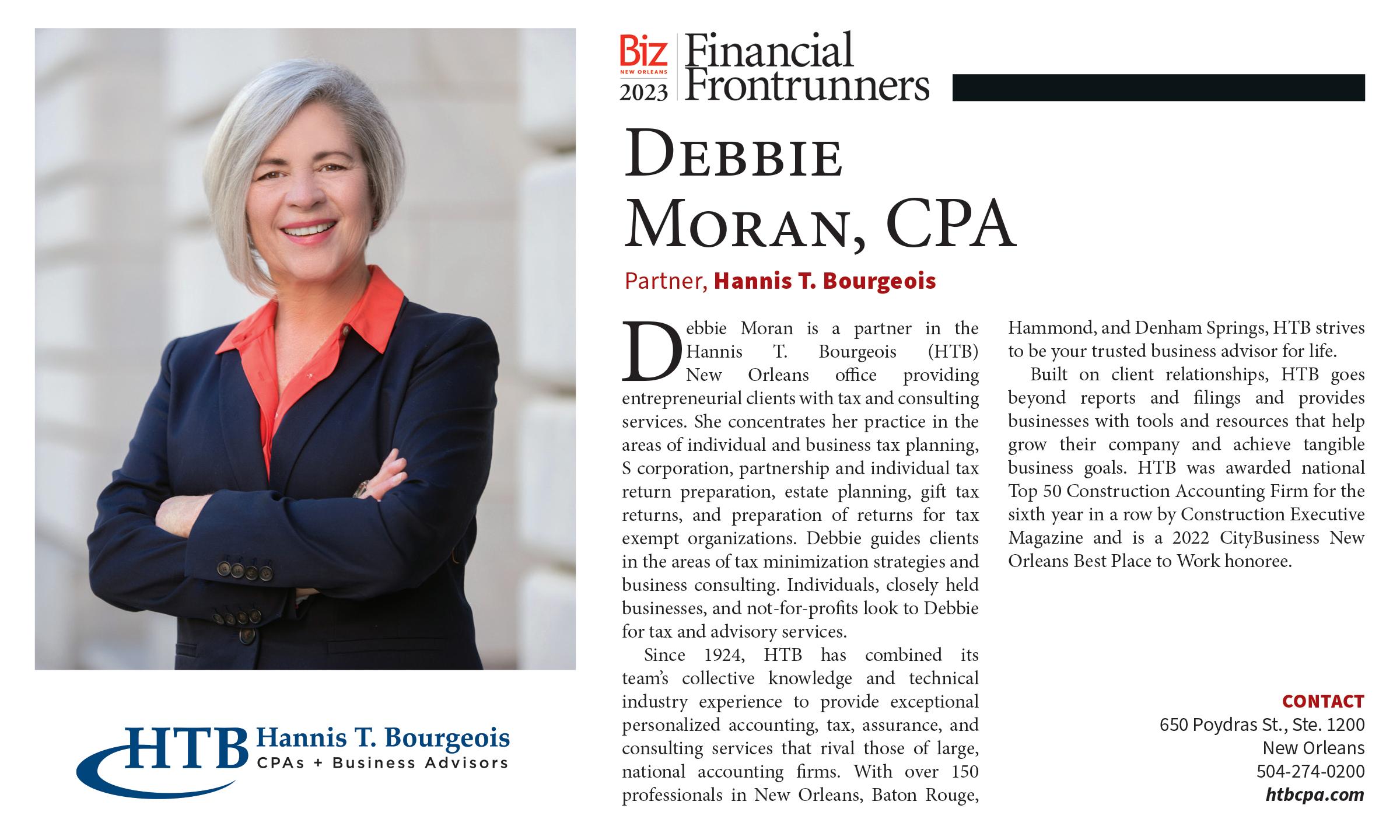
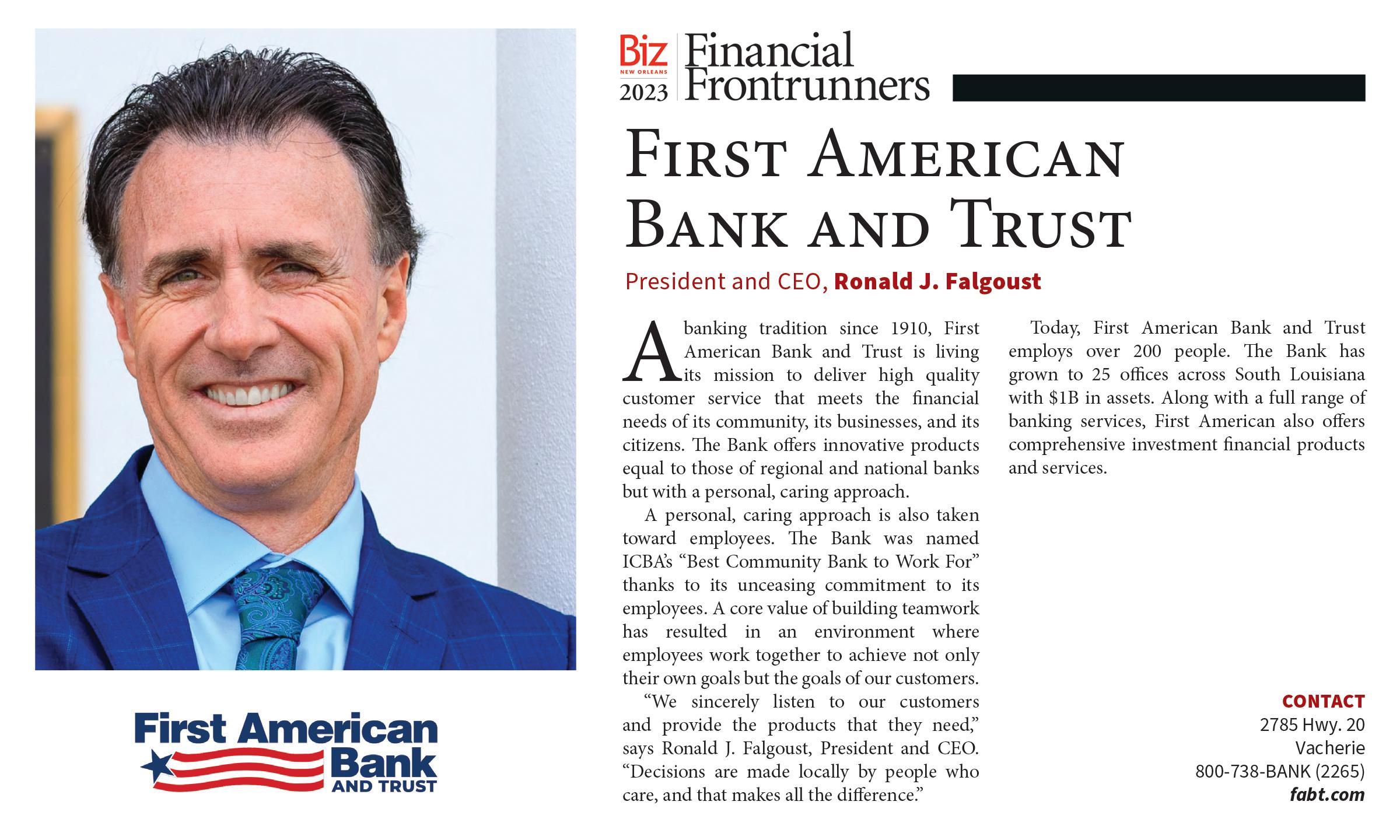
52 BIZ NEW ORLEANS AUG 23
FROM THE LENS
WHY DIDN’T I THINK OF THAT?
Just three years in business, Bea’s Bayou Skincare products — homemade creations of New Orleanian Arielle Brown — are selling quickly on Amazon and Macy’s Marketplace online.

54 GREAT WORKSPACES Current Crop Roasting Shop on Magazine Street provides a fun and interactive setting for coffee lovers to learn more about the bean, including how to roast their own 62 NEIGHBORHOOD GEM A fixture on Metairie Road since 1960, this family run institution continues to serve as a neighborhood summer hangout. 64 NEW ORLEANS 500 John LeBlanc, CEO of Metairie Bank 58
NOT ANOTHER COFFEE SHOP
Current Crop Roasting Shop on Magazine Street provides a fun and interactive setting for coffee lovers to learn more about the bean, including how to roast their own.
 BY MELANIE WARNER SPENCER
PHOTOS BY SARA ESSEX BRADLEY
BY MELANIE WARNER SPENCER
PHOTOS BY SARA ESSEX BRADLEY
In March, Current Crop Roasting Shop opened on Magazine Street in Uptown, but those in search of a cup of joe be forewarned — you won’t get it here. As the name states, this is a roasting shop, not a coffee shop. Visitors here learn about coffee, its origins, the process of growing and making it, and how to roast their own. Owner John Puckett recently shared with Biz the design concept for the space, what customers can expect and what he’s hoping to achieve in the coming months.
What were the design team’s goals and why? John Puckett: The team aimed to create a welcoming and comfortable environment
54 BIZ NEW ORLEANS AUG 23
CURRENT
FROM THE LENS GREAT WORKSPACES
CROP ROASTING SHOP 3931 Magazine Street currentcroproasting.com // @currentcroprs
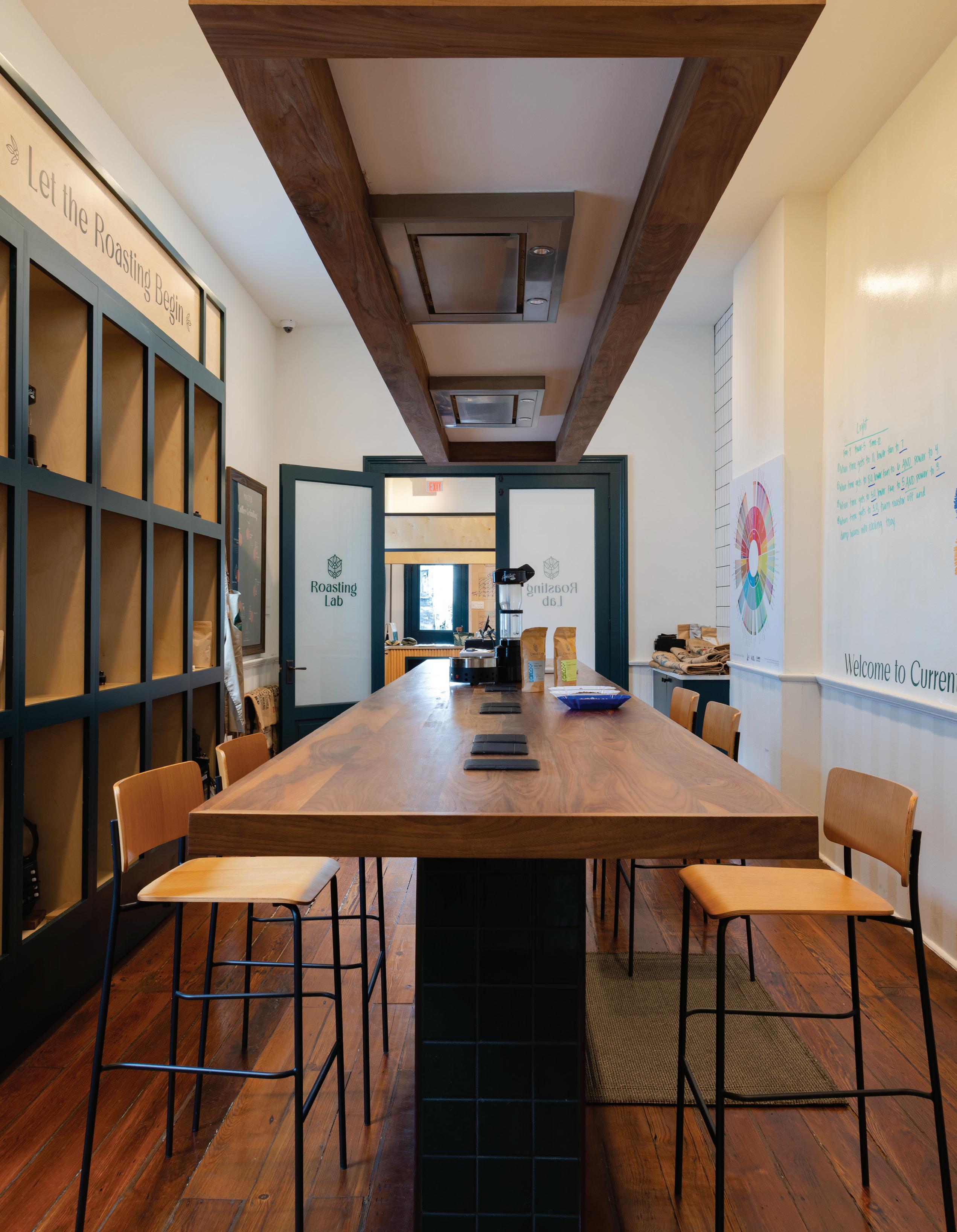 To convert the 1,800-square-foot double shotgun, owner John Puckett worked with Julie Babin and Daniel Kautz of practis architectural firm and Ferriss & Company design studio in Jackson, Mississippi.
To convert the 1,800-square-foot double shotgun, owner John Puckett worked with Julie Babin and Daniel Kautz of practis architectural firm and Ferriss & Company design studio in Jackson, Mississippi.
where guests could interact and learn about the home coffee-roasting process. The goal was to make guests feel at home, enticed to learn and interact, and to have impactful, hands-on experiences. The final design exceeded expectations by providing opportunities to explore the roasting process, the coffee itself and engage with the Current Crop team.
What was the biggest design challenge?
It was creating an attractive and user-friendly solution for the wide variety of beans available to our guests. To overcome this, we introduced the concept of a ‘bean library’ that makes choosing coffee more playful and exciting. This approach allowed for organized showcasing of beans by region, mimicking the orderliness of a traditional library. The solution effectively addressed the challenge of presenting diverse bean options while ensuring an enjoyable shopping experience.

What is the standout feature of the design?
It’s the seamless integration of various
elements that work together to create a fun and approachable coffee-roasting education center. The design incorporates smart product organization, effective space planning, helpful, branded signage and retail areas that are easy to shop. From the classrooms to the bean library, guests enjoy an exciting and interactive environment that caters to coffee-roasting beginners and experts alike.
How would you describe Current Crop and its customer base?
We are a niche market in the coffee world because we offer a unique approach to filling your coffee needs. It’s an experience to visit our store. Customers can choose their own coffee beans based on origin, flavor notes, process, and roast it to their desired roast level. If they don’t have their own equipment, we provide three roasting stations to roast coffee in our store at no cost. Our customers are people who want to learn about the entire coffee process from origin to their cup of coffee.
How do you set yourselves apart from others doing similar work?
We are the first in the market to approach the coffee industry from this perspective. Learning is fun, creative and interactive so many customers add it to their list of hobbies. They love to return to the store to try new beans or change the roast level on the same bean to experience the difference in flavor notes. Our trained staff assists customers with their bean and equipment selections, as well as choosing roast levels for them. We are not a coffee shop but a source for you to buy specialty coffee from all over the world.
How do you promote a positive work atmosphere?
Our staff is always in a learning mode. They are continually learning from each other as well as from our customers’ roasting experiences. We hire individuals who want to interact with customers and share their knowledge and experience of coffee roasting with them.
56 BIZ NEW ORLEANS AUG 23
ADDITIONAL IMAGES AT BIZNEWORLEANS.COM
“Customers can choose their own coffee beans based on origin, flavor notes, process, and roast it to their desired level,” said Puckett.
Interactive elements, such as the “bean library,” various learning stations and classrooms help create a fun and playful atmosphere.
QUICK LOOK
Opening Date
March 1, 2023
Style of building’s architecture
Old New Orleans double shotgun home
Square footage
1,800
Number of Employees
6
Persons in Charge John Puckett, owner; and Catherine Mansell, director of programs and products
Architect Julie Babin and Daniel Kautz of practis (formerly Studio WTA)
Interior designer Mary Sanders
Ferriss of Ferriss & Company in Jackson, Mississippi
Contractor
Cassi Dymond of Kalimera Construction
What are your biggest challenges?
Overcoming the perception that we are just another coffee shop. We do not sell brewed coffee, pastries or consumables in our store.
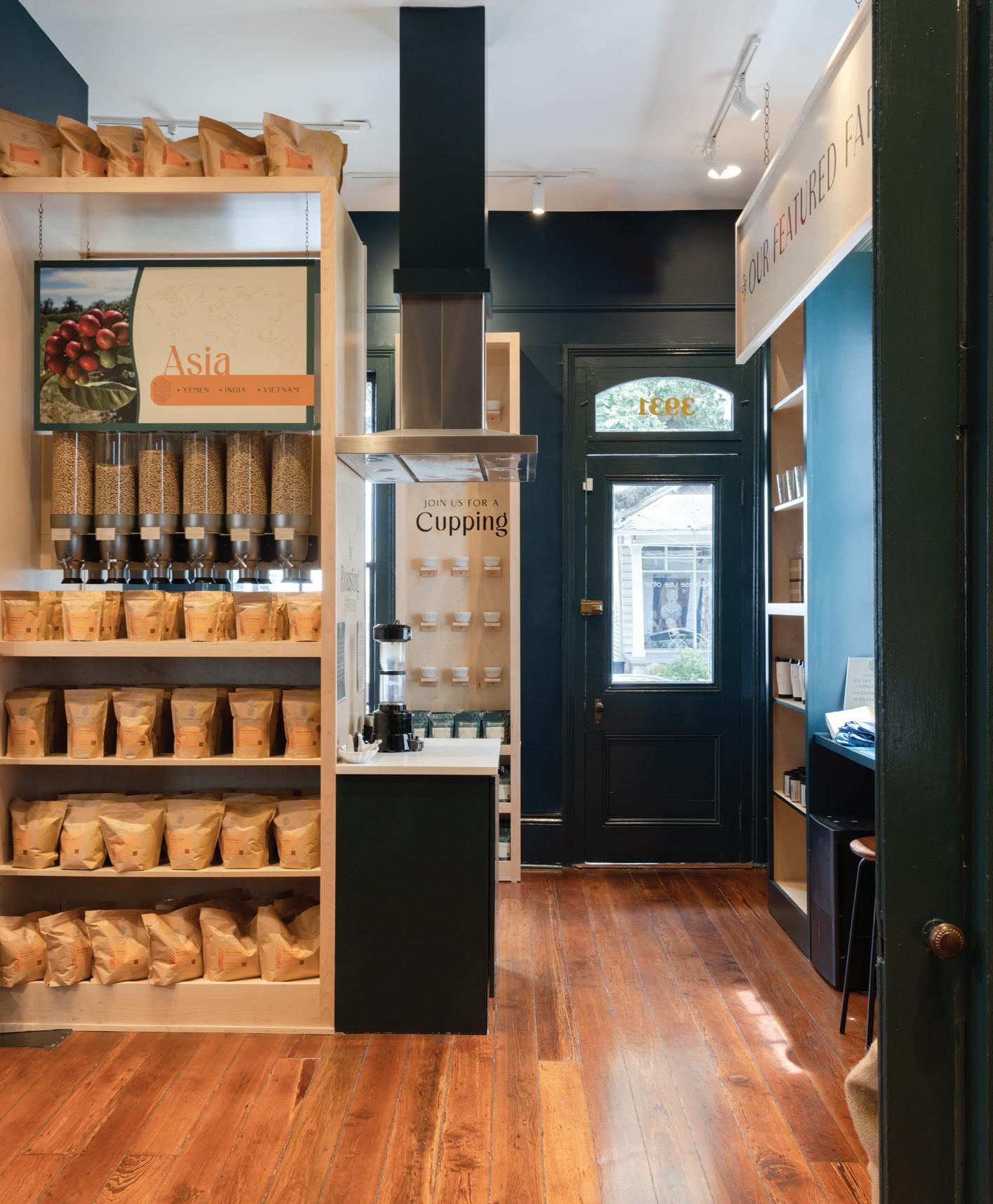
What goals do you have for the next 12 months?
We want to become a household brand name when it comes to options for purchasing coffee. We want to be a coffee resource for individuals interested in the entire coffee process from origin to cup. We want to become a destination store for coffee enthusiasts that want to learn about the coffee they drink or hone their skills for home roastings and brewing.
Anything else you think readers should know?
I would want customers to know that they can roast their own coffee in 10 minutes. It’s inexpensive to begin home roasting, but you also have the option of using our equipment at no cost. Sign up for our roasting and cupping classes. They are fun, educational and most of all interactive. Lastly, we offer custom classes based on customers’ requests. They are great for office team building, clubs, birthdays and groups of all kinds. We have even hosted a supper club and each couple brought a dish to share while Catherine taught roasting. Businesses have brought in lunch for customers and done an interactive roasting class. Check our website and social media for upcoming classes this fall, [such as] coffee cocktails, [and] coffee and dessert pairings. T

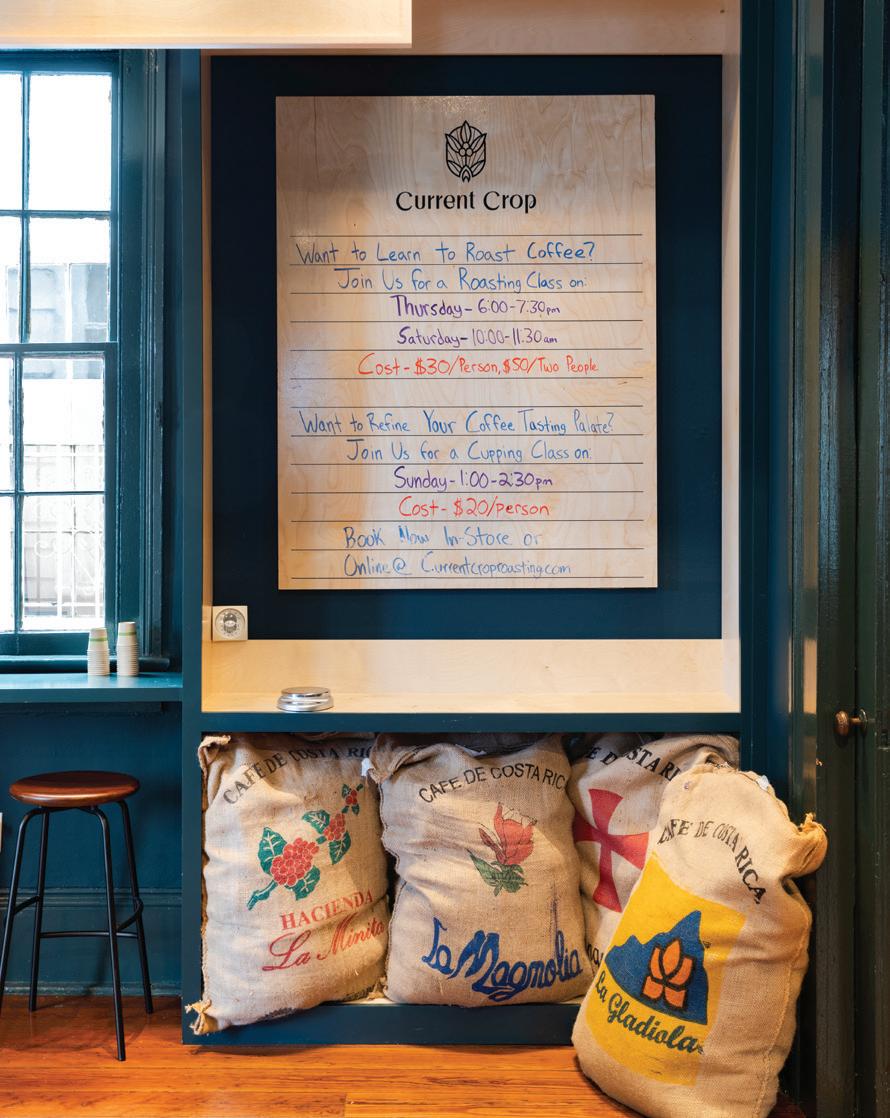
57 BIZNEWORLEANS.COM
FROM THE LENS
WHY DIDN’T I THINK OF THAT?
BAYOU TO THE RESCUE
Just three years in business, Bea’s Bayou Skincare products — a homemade creation of New Orleanian Arielle Brown — are selling quickly on Amazon and at Macy’s Marketplace online.
 BY ASHLEY MCLELLAN
BY EDMUND D. FOUNTAIN
BY ASHLEY MCLELLAN
BY EDMUND D. FOUNTAIN
BEA’S BAYOU SKINCARE Beasbayouskincare.com 866-932-8764 // @beasbayouskincare
58 BIZ NEW ORLEANS AUG 23
PHOTOS
New Orleans skincare entrepreneur Arielle Brown is taking advantage of a rising wave of consumers interested in all-natural, probiotic products, and embracing a new wave of innovative Black-owned cosmetics lines that provide luxury, organic products while also solving practical skincare problems.
Brown created Bea’s Bayou Skincare, a line of natural products designed to alleviate the symptoms of seborrheic dermatitis, a form of eczema that targets the scalp and face. After struggling to find a product that not only worked but also felt and smelled great, Brown researched and created formulas that combined familiar ingredients to promote healing and relief.
“When I was making products from flowers in my yard and soaps in my house as a child, I never thought that it could be a career path to make products,” she said. “When I was excelling in biochemistry in junior high, I didn’t
New Orleans native Arielle Brown created Bea’s Bayou Skincare, a line of natural products designed to alleviate the symptoms of seborrheic dermatitis, a form of eczema that targets the scalp and face.
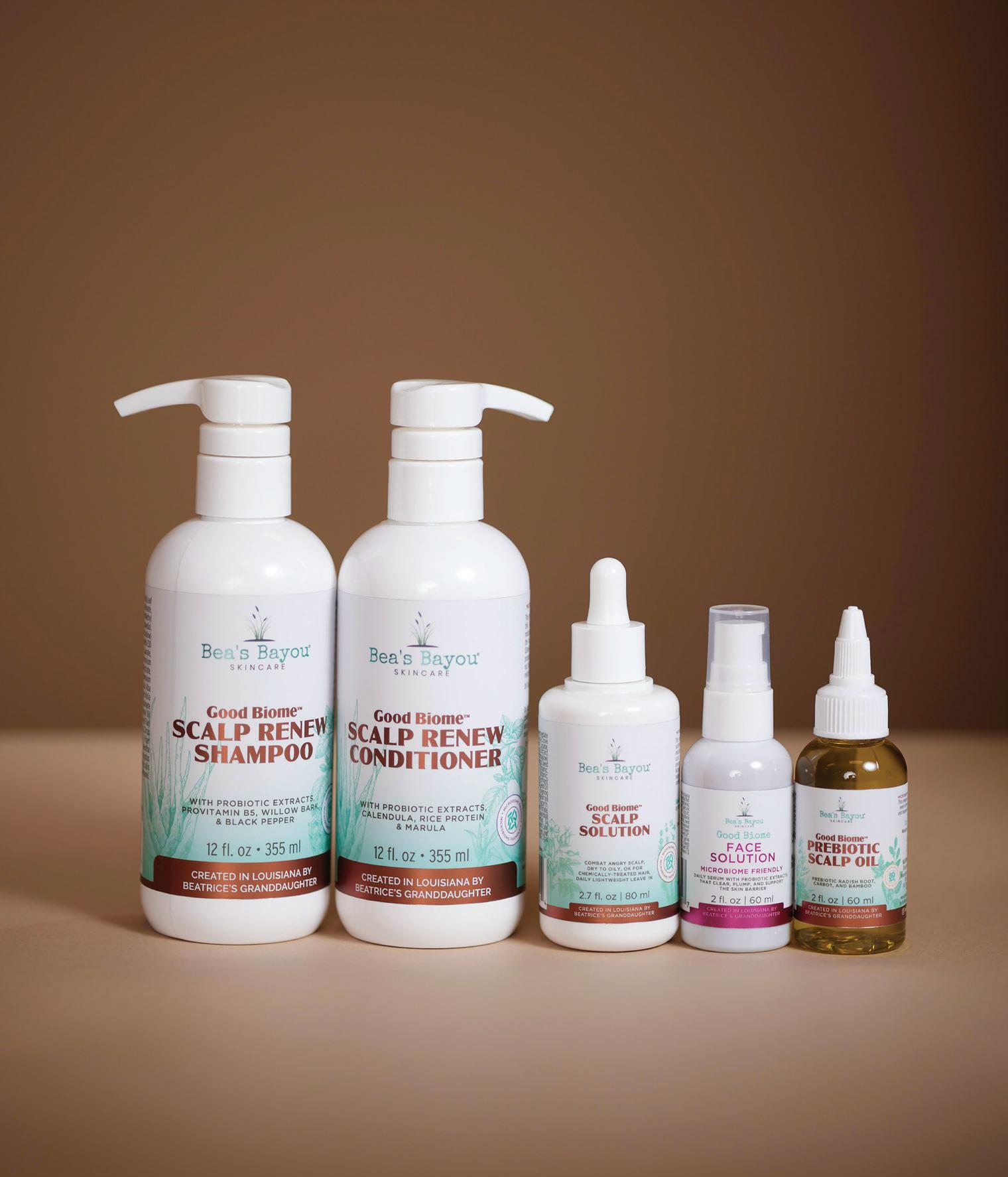
Although excited to fulfill a family dream, Brown stresses that when she created her first product it wasn’t with the goal of starting a business, but of just finding relief for her itchy scalp.
“Timing, environment and support from others has gotten us here to three years,” she said.
Originally developed in her home kitchen, Bea’s Bayou is still a one-woman business but is quickly growing through a wildly popular product line and sales through Amazon, Macy’s and Etsy.
“I am currently our only employee, though we have about eight professional contractors for marketing, design, bookkeeping and some other key tasks. We have a few U.S.-based manufacturers for the product itself. I work with their chemists to perfect the formulas that I write at home. For bottles, I source them from both the U.S. and Asia. Our labels are designed on Canva and then sent to our graphic designer who takes my ideas and improves them for marketing and print.”
Brown just completed the Macy’s Accelerate program and secured placement on Macy’s Marketplace online.
“That was amazing,” she said, “seeing how I used to work at Macy’s in my undergraduate years. Life is funny like that sometimes.”
DID YOU KNOW?
know that chemistry could result in a cosmetics career. When I was suffering from seborrheic dermatitis through the last 20 years of my life, I didn’t know I’d ever create a science-backed herbal cosmetic brand to help people like me — and surely never thought it would be around for three years and I’d be seeking funding for it from equity investors one day.”
Launched in 2020, Bea’s Bayou was named after Brown’s maternal grandmother, an influential member of her south Louisiana community known for her natural remedies. Brown sees Bea’s Bayou as the culmination of two generations of entrepreneurship and a commitment to solving a problem with practical know-how.
“Bea’s Bayou is named after my maternal grandmother, Beatrice, who lived in a bayou region in Vermillion Parish,” she said. “People from the area all knew her for her pies, herbal tinctures and pralines. She didn’t get to bring her products to market, but my generation has more opportunities.”
Benefits of probiotic skincare, according to Medical News Today (April 2022)
Reduced redness, scaling and itching for those with atopic dermatitis and eczema reduce some of the visible signs of aging, such as sun damage.
May help to relieve acne and psoriasis
Bea’s Bayou is hitting its stride at a time when consumers are increasingly looking for natural alternatives to skincare solutions. According to a March 2023 report by The Brainy Insights, “the microbiome cosmetic products market will grow from $45.71 million in 2022 and reach $76.16 million by 2030. In just eight years, microbiome cosmetic products have moved from an uncertain, standalone niche use case to a fast-growing, high return on investment (ROI) application that is truly delivering value to users.”
59 BIZNEWORLEANS.COM
Inspired by her maternal grandmother’s homemade tinctures and remedies, Brown’s products contain all-natural proand prebiotics and skin-soothing herbal ingredients like marshmallow, oregano, lavender and clove.
The report goes on to note, “Some elements pushing probiotic cosmetics sales include growing educated and well-trained customers, more understanding towards probiotic moisturizer benefits, and rising choices for prebiotics and probiotic skincare.”
Brown developed Bea’s Bayou products specifically for those impacted by eczema who are finding little to no relief from very processed chemical products.
“Our natural- and microbiome-friendly products are perfect for the frustrated person dealing with flaky and angry scalp or eczema-related itch. We have a core product line that is inclusive, herbal and leveraging the power of probiotics for cosmetics. We feature bayou herbs, too — like blue-green algae, sassafras, clove and others.”
Products in Bea’s Bayou Skincare line include the Good Biome Scalp Solution, Prebiotic Scalp Oil, Facial Solution, Toning Mist, Setting Mist, and Scalp Renew Shampoo and Conditioner. Products range in price from $10 to $30, with product bundles also available at a range of prices.
“Our Good Biome line includes our bestselling hero product, Good Biome Scalp Solution, which is water-based and lightweight,” Brown said. “Our customers love that it features prebiotics, postbiotics, marshmallow, herbs like oregano, lavender and clove, and plant oils that absorb fast without residue, like evening primrose.”
As a Black-owned cosmetic company, Bea’s Bayou is still rare in the industry. According to McKinsey, which released an in-depth look at the cosmetics industry in June 2022, “Black brands—defined as either Black-founded or Black-owned—make up only 2.5% of revenue in the beauty industry, yet Black consumers are responsible for 11.1% of total beauty spending.”
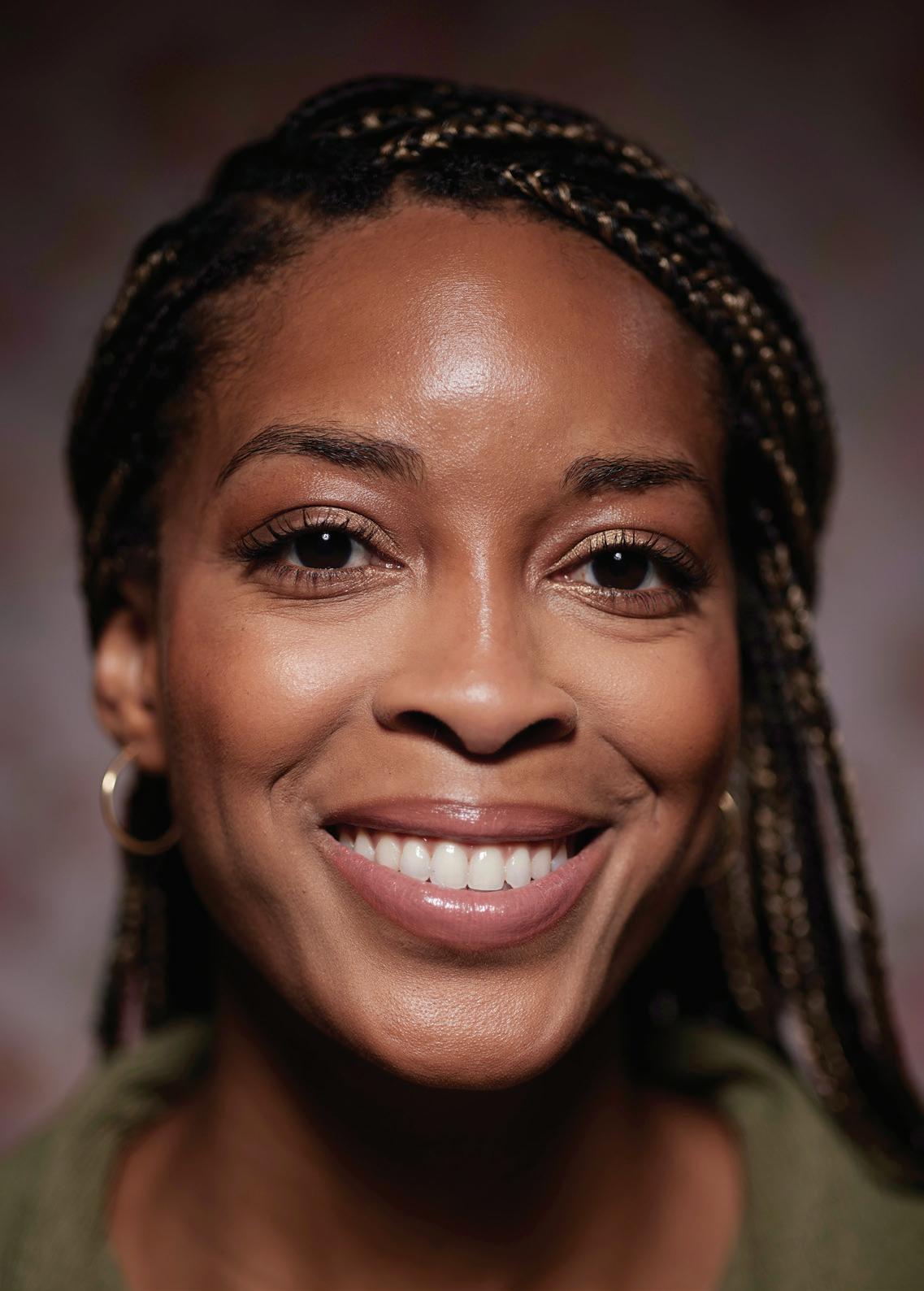
It goes on to state that while historical inequities have been a part of the business, moving forward in a new way is essential for economic growth across the industry. “Creating a path to a more equitable beauty market represents a $2.6 billion opportunity, and the road forward— while perhaps not easy—is clear…from starting with better research about Black consumers to increasing representation in the industry, from the sales associate up to the C-suite level, to better partnerships with, support of, and investment in Black brands. By taking some bold steps and opening the gates to more Black entrepreneurs who can innovate with products for Black and non-Black consumers, the beauty industry can enact authentic, permanent, and beneficial change and create substantially more economic upside in the quest for greater equity.”
Brown continues to develop and innovate her product line backed by the support of fundraising and crowd sourcing and a new release on the horizon.
“I have been pitching and talking to investors who are interested in being on the journey with early-stage CPG companies that are unique, like Bea’s Bayou. I am growing every day, learning from the founders that have become friends, as well as from my advisors. I am also applying for grants as they become available.”
The company has a strong customer base. “[Our] shampoo and conditioner were results from a rewards-crowdfund campaign with Fund Black Founders,” said Brown. “Our customers are truly amazing for supporting the growth, however long it takes. We are onboarding with Macy’s online, working on our Zinc & Sassafras Scalp Mask release, and I’ll be speaking on the Aveeno panel at CultureCon in L.A. We are also working on product certifications, so I’m very excited for it all to manifest better than I could dream!”T
BLACK-OWNED BEAUTY AND SKINCARE BRANDS ON THE RISE:
Eve Milan New York, skincare, cleansers and serums
Flora and Noor, shea body butter
Pierre Performance, skincare and moisturizer for men
UnSun, skincare and tinted sunscreen
Fenty, Rhianna’s wildly popular skincare line and makeup line
Kinlo, sunscreen and body gel founded by tennis star Naomi Osaka
KNC Beauty Lip Balms
60 BIZ NEW ORLEANS AUG 23 ADDITIONAL IMAGES AT BIZNEWORLEANS.COM

FROM THE LENS NEIGHBORHOOD GEM
Sal’s Sno-balls
BY KEITH TWITCHELL
SAL’S SNO-BALLS 1823 Metairie Ave. // Metairie // (504) 666-1823 facebook.com/salssnoball // @salssnoball
A“t one time there were 13 snoball stands on Metairie Road,” recalled Steven Bel, owner of Sal’s Sno-balls. “Now I’m the last guy standing.”

Tucked back from Metairie Road, prefaced by an oak-shaded gravel parking lot, Sal’s has been a neighborhood institution since 1960.
“Sal [Talluto] used to have a grocery store across the street, but he had a heart attack in 1958 and had to cut back,” Bel recounted. “He owned the house here, and he’d had a snoball stand before, so he opened a small stand in front of the house.”
The storefront was expanded for the 1969 summer season. At about the same time, the then-8-year-old Bel began picking up trash around the place for a dollar. By age 10, Sal was teaching Bel how to make snoballs. After the founder passed away, Bel worked for his wife and daughters.
Bel purchased the stand in 1991, while still working full-time for Continental Airlines. To this day he is committed to keeping the original flavors and methods intact.
“We use the same recipes that he started with in 1960,” noted Bel. “We make everything from scratch, no preservatives, which means the syrups only last about 24 to 48 hours.”
Bel said the key to successful snoball marketing lies in creative flavor names. For instance, “Blue Eagle” sells better than “Blueberry.” Some names reflect the times when they were invented, such as “Popeye” or “Sock It To Me,” a nod to the tagline of the popular “Laugh-In” TV show of the mid-60s.
While Hurricane Katrina didn’t cause major devastation along Metairie Road, the ensuing havoc put far more demands on Bel’s time. Within two years, he quit his job to focus on running Sal’s.
The pandemic has had similar impacts. Bel described his biggest challenge as “what COVID has done to the supply industry. Now sometimes I have to drive to Baton Rouge just to get sugar.”
To address this, Bel buys in bulk where possible.
“We don’t want to run out of anything, so I’ve become a real hoarder,” he said with a laugh.
This approach also helps with his other major challenge, keeping his prices down. Volume sales are key to this, and being a local institution helps.
“It’s a big neighborhood hangout,” said Bel. “People sit outside and talk to their neighbors, kids run around, dogs are playing. Some people do come from farther away, partly because we are open late. We have families who have been coming here for generations.” T
62 BIZ NEW ORLEANS AUG 23
A fixture on Metairie Road since 1960, this family run institution continues to serve as a neighborhood summer hangout.

John LeBlanc
CEO of Metairie Bank
DID YOU KNOW?
This local banking veteran assumed his current role in February 2022. He has served as the chairperson of the Jefferson Chamber of Commerce and as a member of the executive leadership council of the American Cancer Society. Founded in 1947, Metairie Bank claims total assets over $600 million and operates nine branches spread across both sides of Lake Pontchartrain.
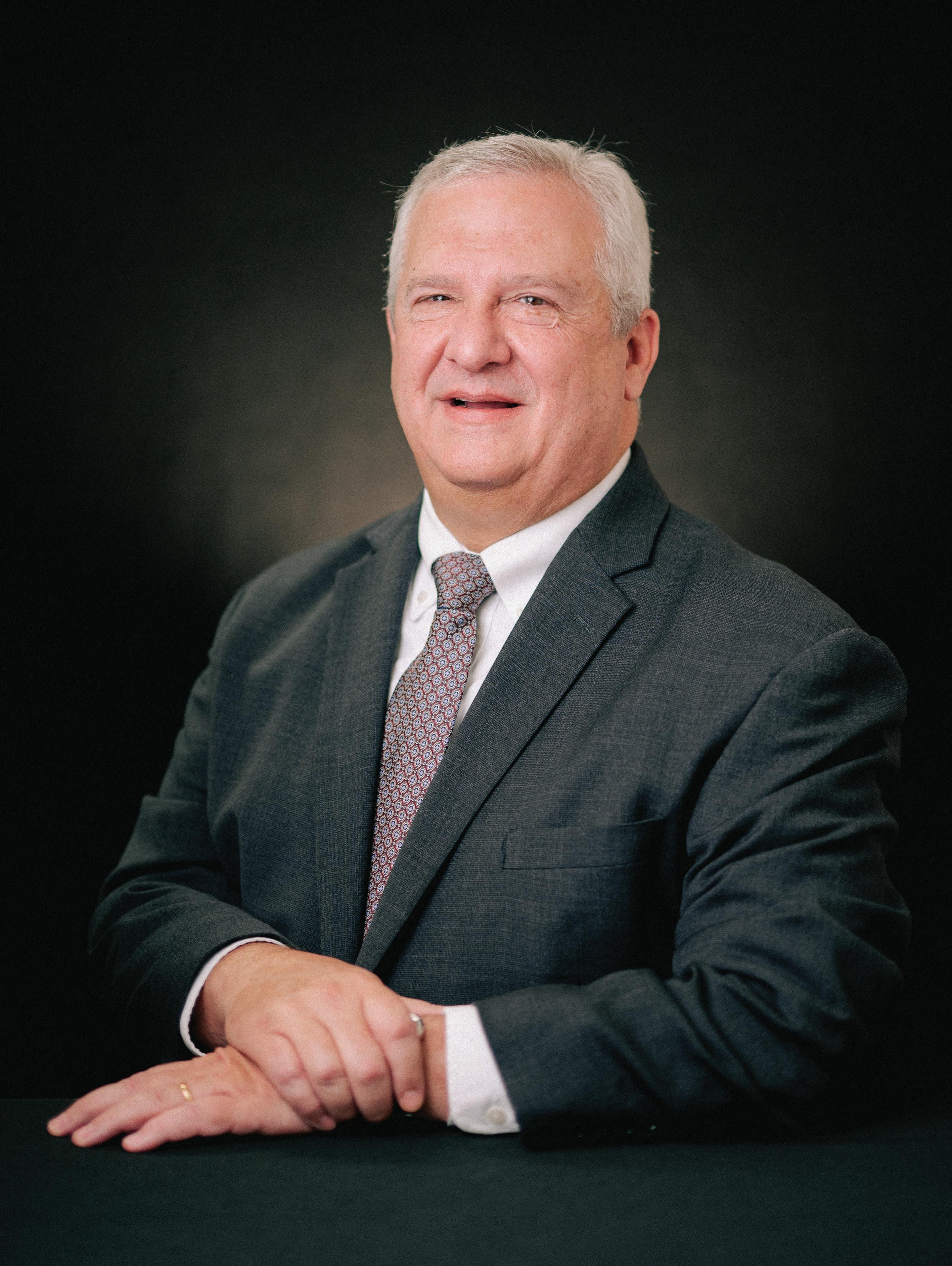
Education: University of New Orleans (BS)
Go-to Restaurant: Katie’s
Best Fest: French Quarter Fest
Hidden Gem: The Midway on Freret
Advice: “Be honest. Be sincere. Be genuine.”
Best Part of the Job: “I love the people I get to spend my days with.”
History: Worked 23 years at Bank of New Orleans
64 BIZ NEW ORLEANS AUG 23
PHOTO BY MIKE LIRETTE
FROM THE LENS NEW ORLEANS 500
ADDITIONAL Q+A ONLINE AT BIZNEWORLEANS.COM
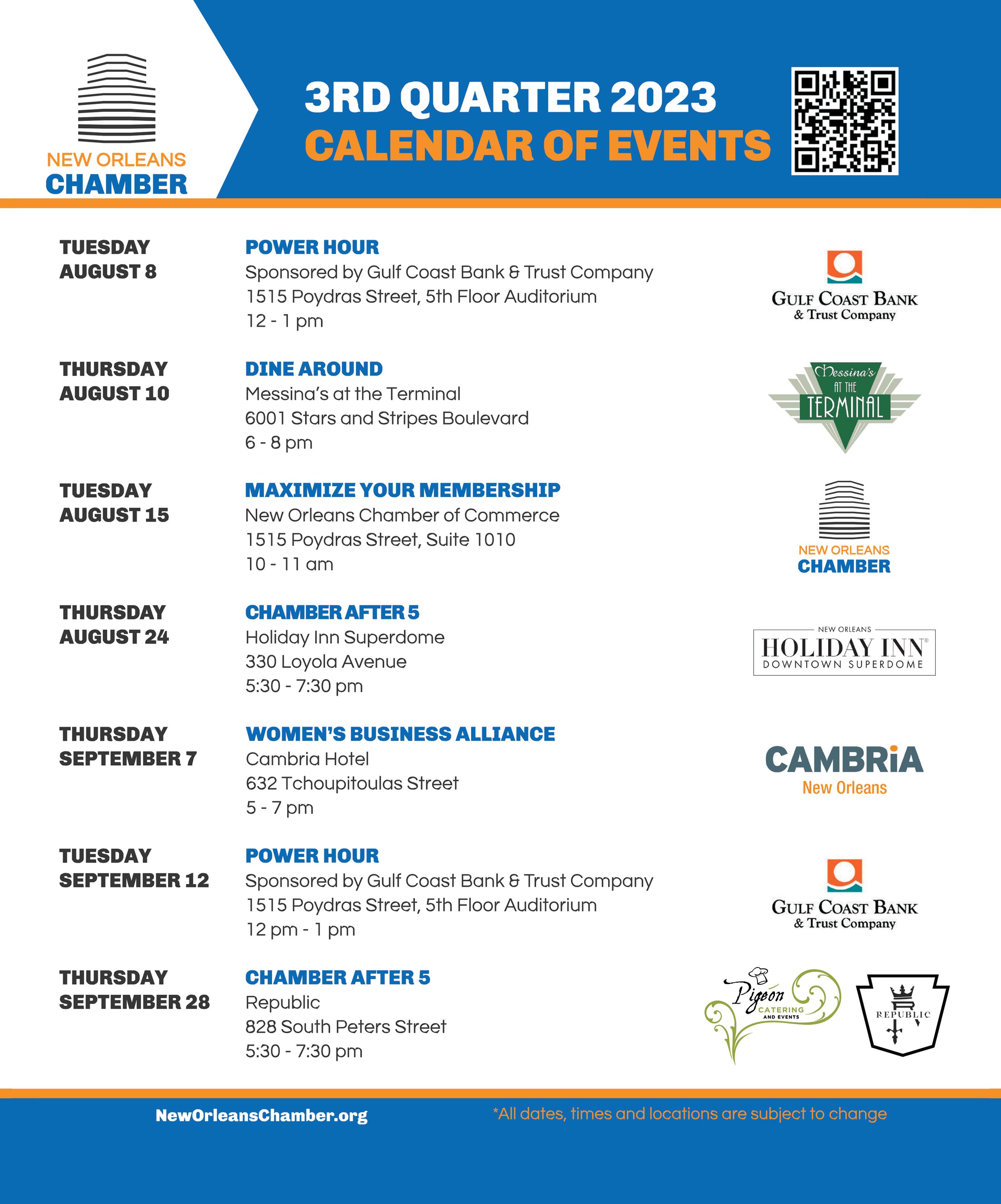


























 Publishing
Publishing























 BY RICH COLLINS
BY RICH COLLINS














 Natalie Barranco, co-founder of Prime Business Advisory Solutions, offers her
Natalie Barranco, co-founder of Prime Business Advisory Solutions, offers her
















 BY MELANIE WARNER SPENCER
PHOTOS BY SARA ESSEX BRADLEY
BY MELANIE WARNER SPENCER
PHOTOS BY SARA ESSEX BRADLEY
 To convert the 1,800-square-foot double shotgun, owner John Puckett worked with Julie Babin and Daniel Kautz of practis architectural firm and Ferriss & Company design studio in Jackson, Mississippi.
To convert the 1,800-square-foot double shotgun, owner John Puckett worked with Julie Babin and Daniel Kautz of practis architectural firm and Ferriss & Company design studio in Jackson, Mississippi.




 BY ASHLEY MCLELLAN
BY EDMUND D. FOUNTAIN
BY ASHLEY MCLELLAN
BY EDMUND D. FOUNTAIN







